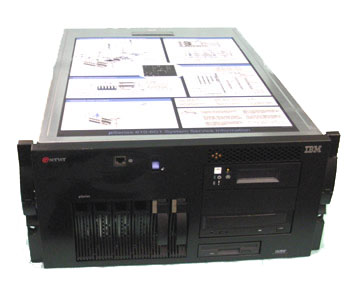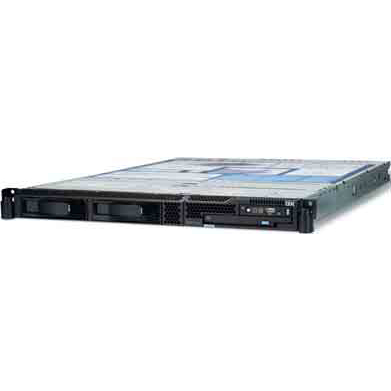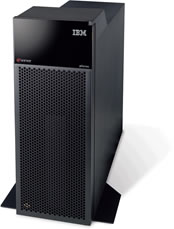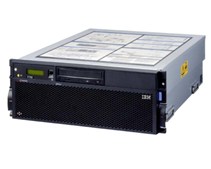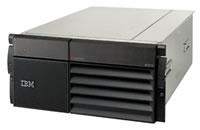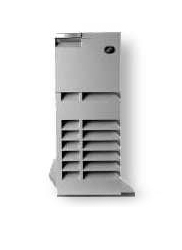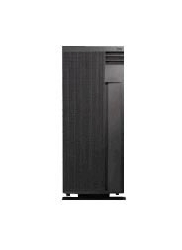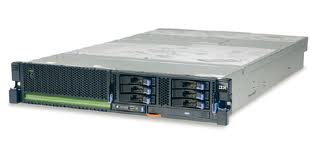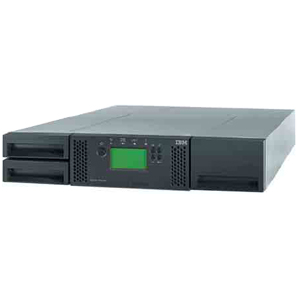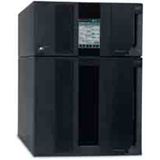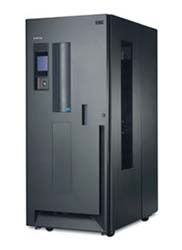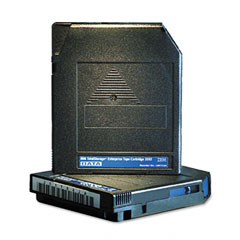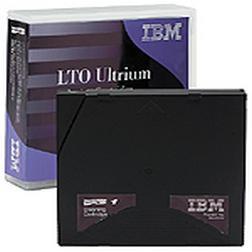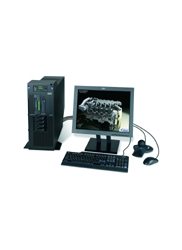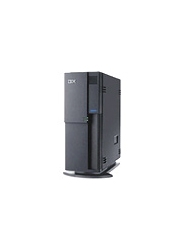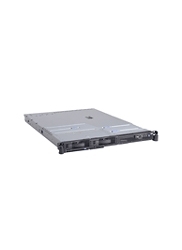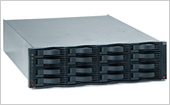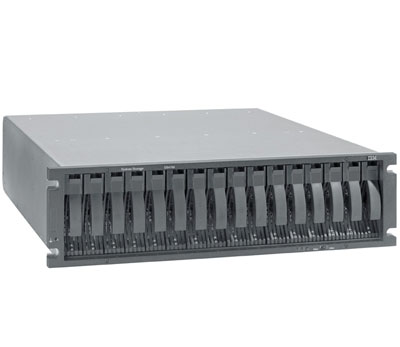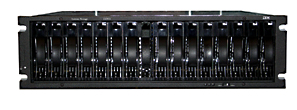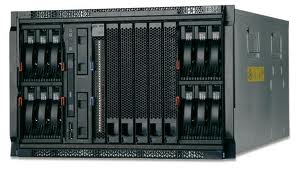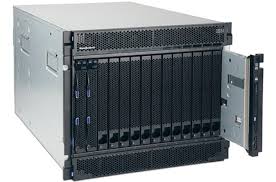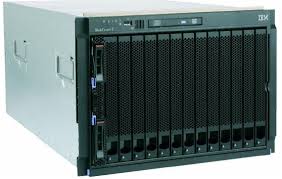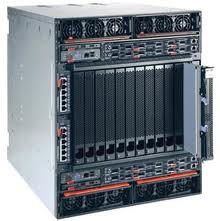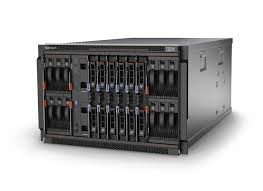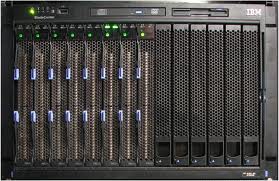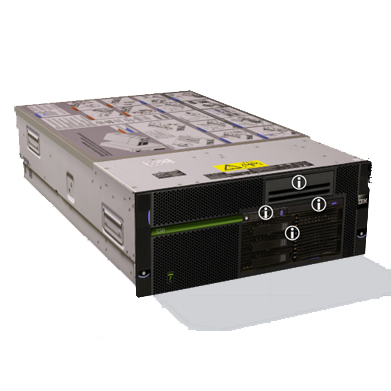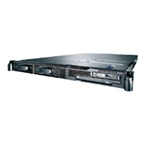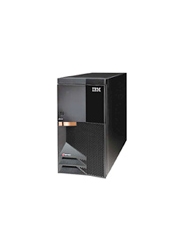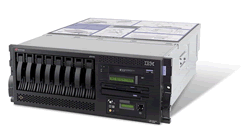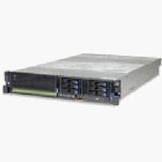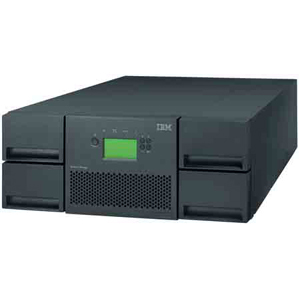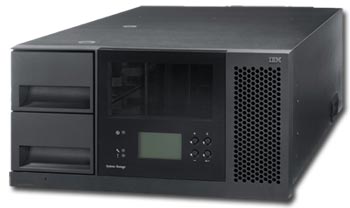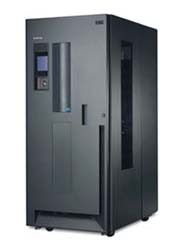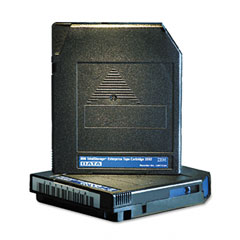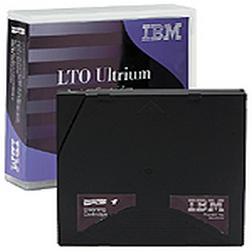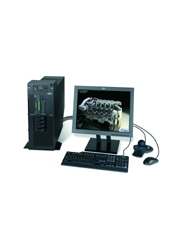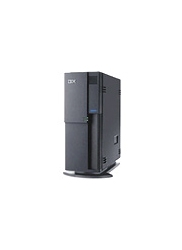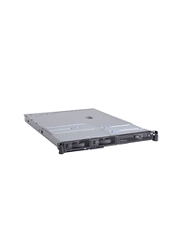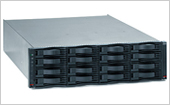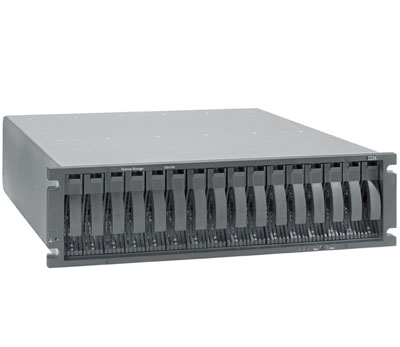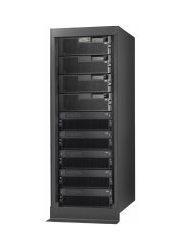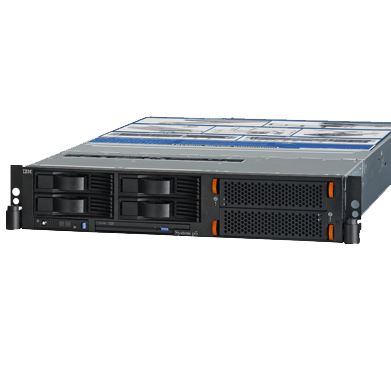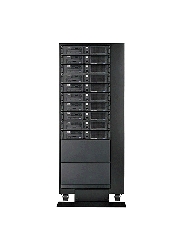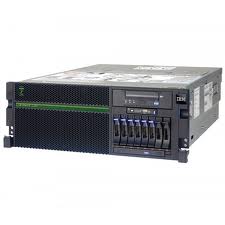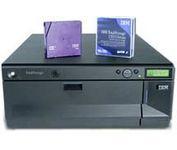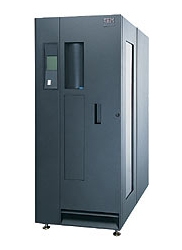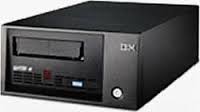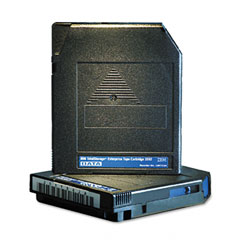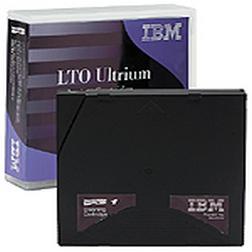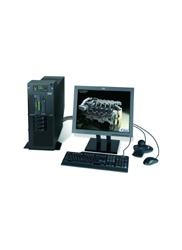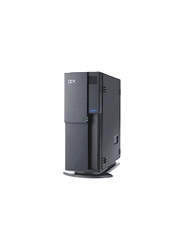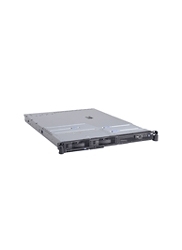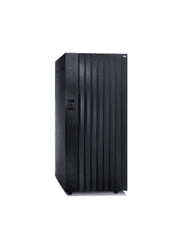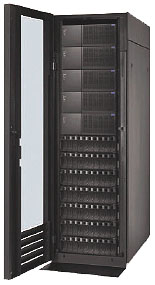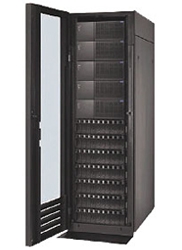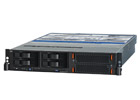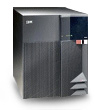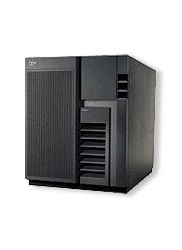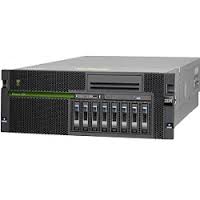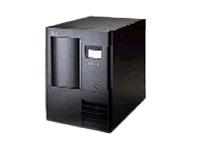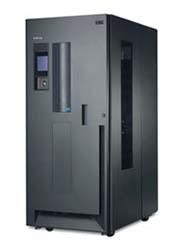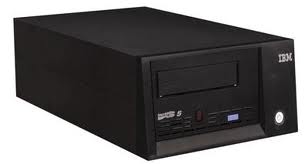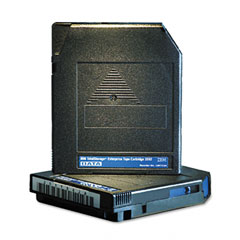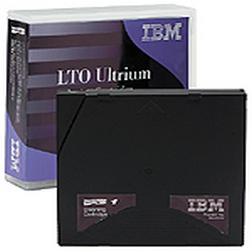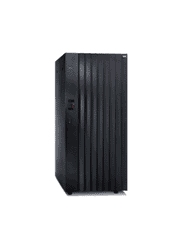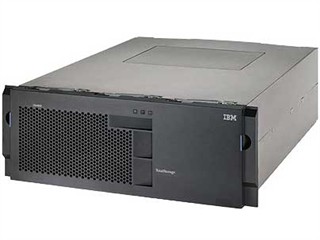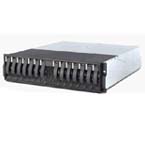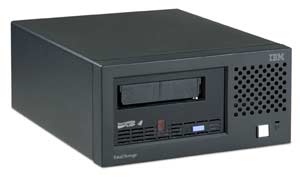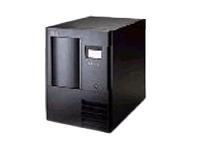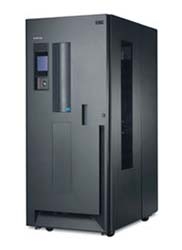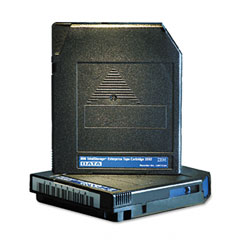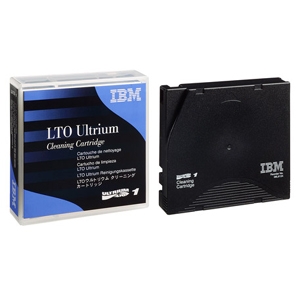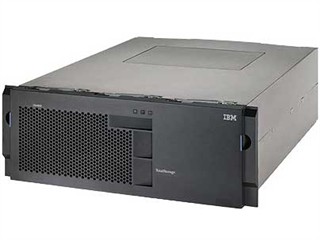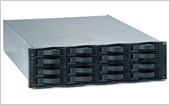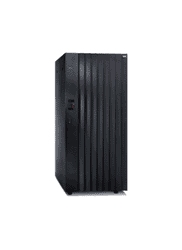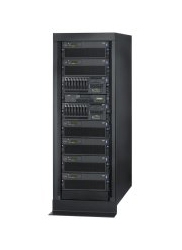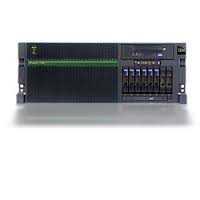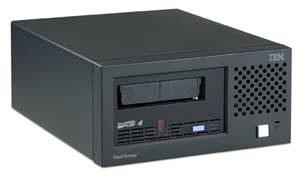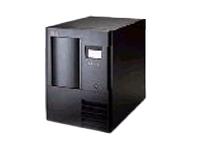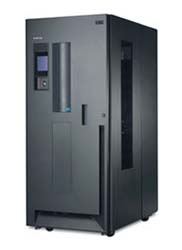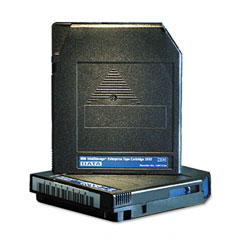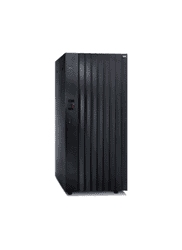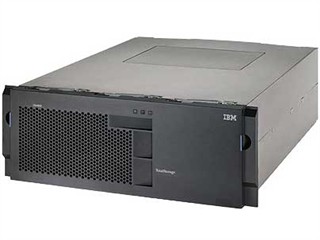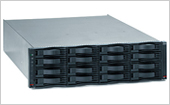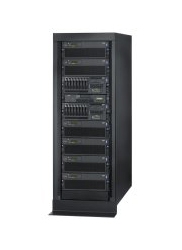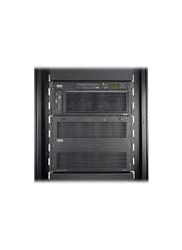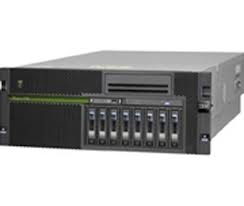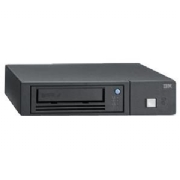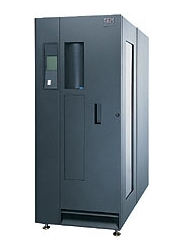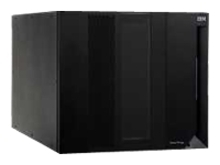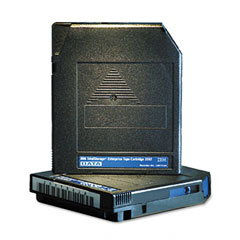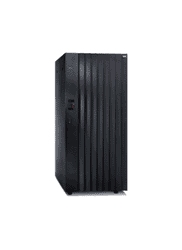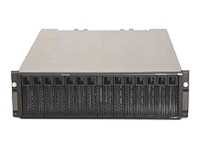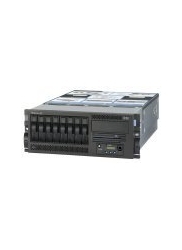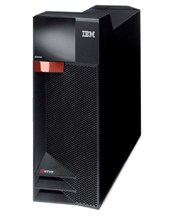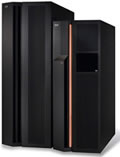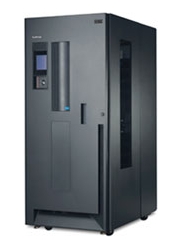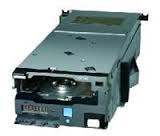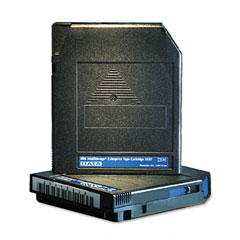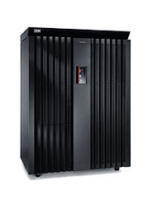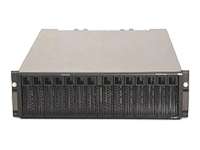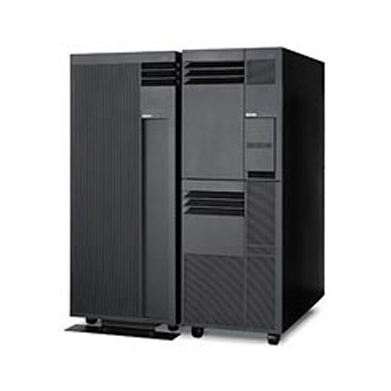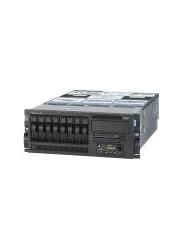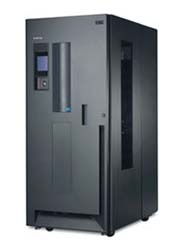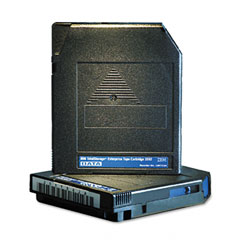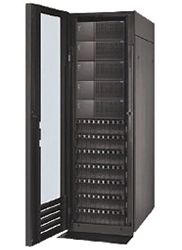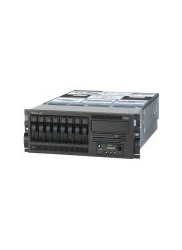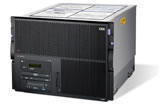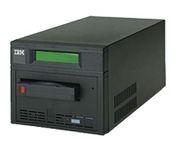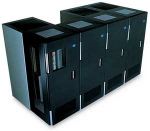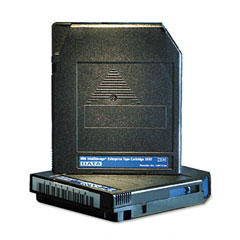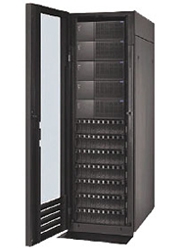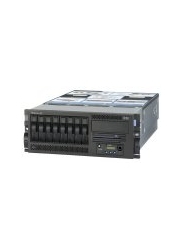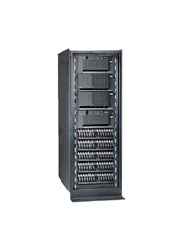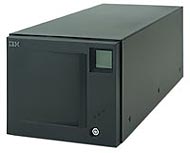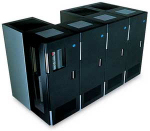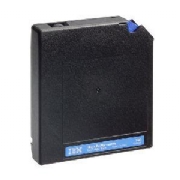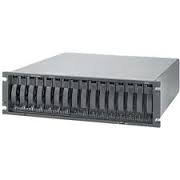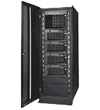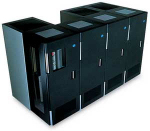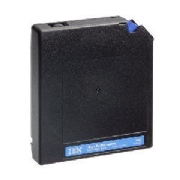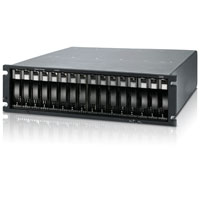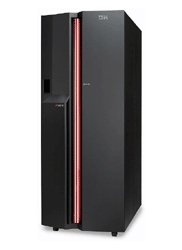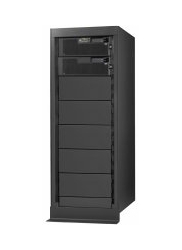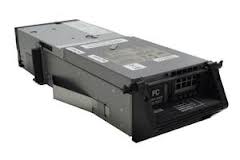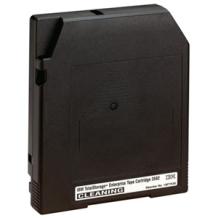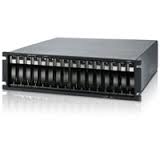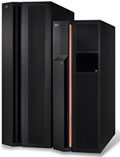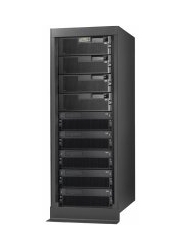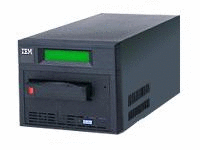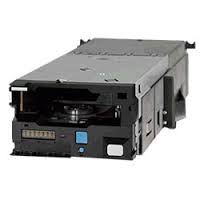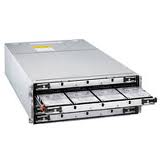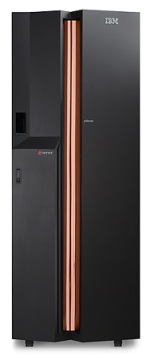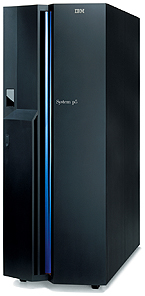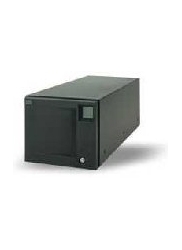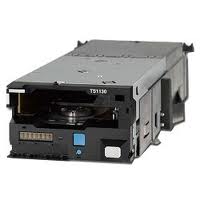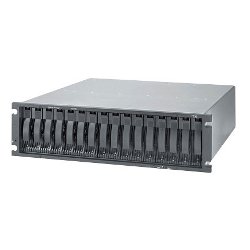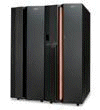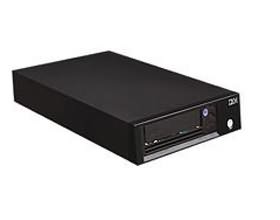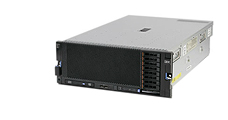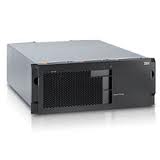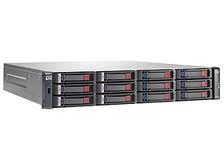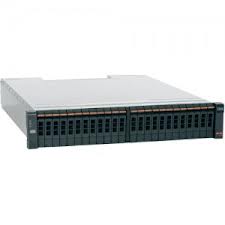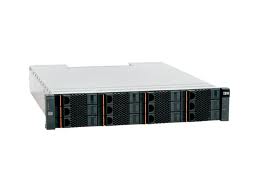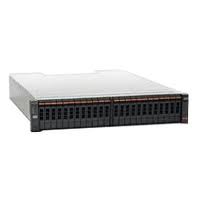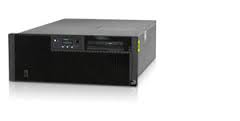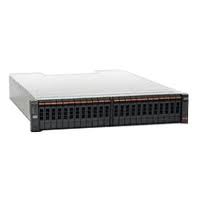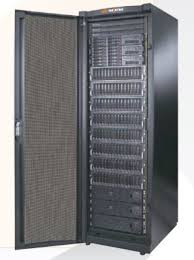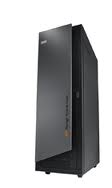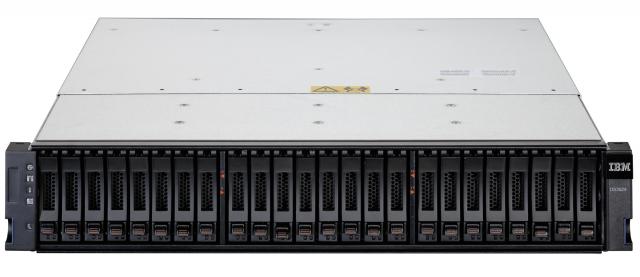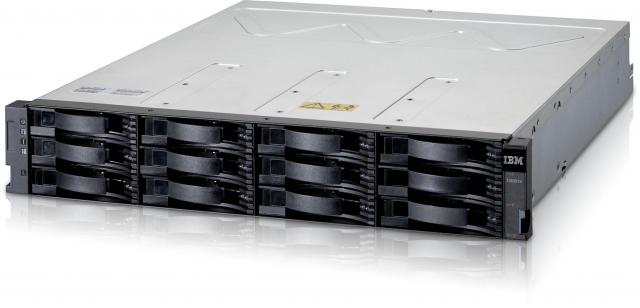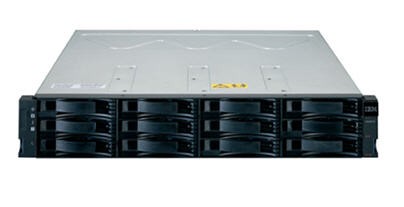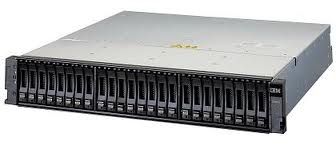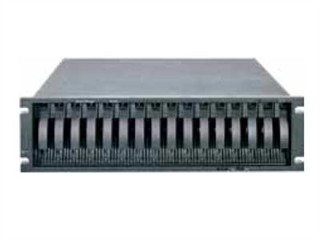Products
With the need for data storage increasing rapidly the capital cost, physical space, power & cooling costs and setup requirements can soon mount up. Blade servers can help overcome these problems by offering all the functional components of a traditional server but with a modular design that is optimised to minimise its physical size and energy usage.
Additionally, they allow for reduced complexity and simplified, centralised management due to the fact that they share resources such as switches and interface cards. When used in conjunction with virtualisation they can provide the framework for a future-proof data center.
IBM POWER 520 (8203-E4A)
The IBM Power Systems 520 Express server offers:
- 64-bit scalability, offering 1-, 2-, and 4-core configurations
- Powerful, symmetric multiprocessing (SMP), on demand server
- Deskside or rack-mount configuration
- Integrated 10/100/1000 dual-port Virtual Ethernet with optional 10/100/1000 quad-port or dual-port 10 Gb Virtual Ethernet
- EnergyScale(TM) technology
- Performance and capacity needed by your demanding applications
- Up to 64 GB of memory
- Five PCIX/PCIe I/O slots; two GX+ slots
- Up to 1800 GB of internal disk storage
- One media bay for DVD-ROM or DVD-RAM
- One media bay for tape drive
read more
IBM pSeries 610 Rackmount (7028-6C1)
The IBM pSeries 610 Model 7028-6C1 systems are one or two-way general-purpose UNIX servers that deliver outstanding performance at an affordable price. As companies extend their e-business infrastructures, these systems have the versatility to function well in many roles, including application and small database serving.
read more
IBM p5 505 (9115-1F4)
The IBM p5 505 offers:
- 1U 19-inch rack-mount packaging
- One or two 64-bit 1.9 GHz POWER5+ processor cores or two 64-bit 2.1 GHz POWER5+ processor cores
- 1.9MB L2 and 36MB L3 cache (no L3 on 1-core system)
- 1GB to 32GB DDR2 SDRAM
- Two PCI-X 2.0 adapter slots (266 MHz (DDR)); one long and one short low-profile
- Two hot-swappable SCSI disk bays for up to 600GB of internal storage
- Dual channel Ultra320 SCSI controller external SCSI port
- Dual ported Ethernet 10/100/1000 Mbps controller
- Optional 4 Gigabit Fibre Channel and 10 Gigabit Ethernet adapters
- Two USB, two HMC, two system ports
- One slimline media bay
read more
IBM pSeries 615 Deskside (7029-6E3)
Model Highlights 7029-6E3
- Powerful, symmetric multiprocessing (SMP), e-business server
- Deskside (Model 6E3) configuration
- One 1-way or 2-way state-of-the-art, IBM 64-bit POWER4+ processors running at either 1.2 GHz or 1.45 GHz (2-way only)
- Performance and capacity needed by demanding e-business applications
- Up to 16 GB of memory
- Up to 1174.4 GB of internal disk storage
- Eight hot-swap disk bays and six hot swap PCI-X slots for feature expandability
- Two slimline media bays for DVD-ROM and diskette
- One media bay for tape drive or DVD-RAM
read more
IBM pSeries 630 Rackmount (7028-6C4)
The Model 6C4 delivers a cost-efficient growth path to the future through such attributes as:
- 1 GHz POWER4 processors or 1.2 and 1.45 GHz POWER4+ processors
- Expandability and reliability:
- System memory expandable from 1 GB to 32 GB
- Four hot-swap, front-accessible disk bays
- Four hot-swap 3.3 V PCI-X slots with 1.0 GHz processor systems, Six hot-swap 3.3 V PCI-X slots with 1.45 GHz processor systems".
- Integrated service processor
- Support for SCSI, SSA, and Fibre Channel attached storage systems
- Support for 32-bit and 64-bit applications
read more
IBM pSeries 640 (7026-B80)
Model Highlights 7026-B80
- Outstanding value in a powerful, symmetric multiprocessing (SMP), e-business server optimized for high-density environments
- Rugged, space-saving rack-mount, slide-in chassis packaging designed for extreme levels of availability, maintainability, and ease-of-use with tool-less access
- Design optimized for ease-of-growth by providing internal upgrade paths and horizontal scaling options to meet rapidly changing capacity demands
- Up to four, state-of-the-art, IBM 64-bit POWER3-II processors that exploit unique copper-based technology for high performance and reliable service
- Up to 16 GB of memory and 145.6 GB of internal disk storage for the performance and capacity needed by demanding e-business applications
- Innovative systems management feature using handheld devices like Palm Pilot
- NEBS Level 3 compliant for the telecommunications carrier grade environment
read more
IBM RS/6000 F50 (7025-F50)
The Model 7025-F50 offers:
- 1 to 4-way SMP desktop server with superior commercial price/performance.
- Offers affordable upgrades, including additional processor speeds and memory.
- Cost effective RAID-5 is available for internal attachment lessening the need for expensive RAID systems.
- First RS/6000 server to use Synchronous DRAM (SDRAM) memory technology to enhance system performance.
- Can be configured with SCSI-2, UltraSCSI, or SSA RAID disk.
- Outstanding reliability via ECC memory, ECC L2 cache, plus a standard service processor.
- Hot-swappable disk bays give improved system availability, smooth growth and data portability.
- Designed for ease of scalability and expandability including the ability to add media devices, system disk and backplanes, system processor cards, Dual In-Line Memory Modules (DIMMs) and memory card(s), as well as I/O adapters without changing the standard power supply.
- Adheres to Open Industry Standards as well as industry standards in general. The I/O subsystem is PCI/ISA-based and also supports the industry interconnect standards of SCSI, UltraSCSI, and SSA.
- Preconfigured tailorable solutions for ease of ordering, installation, and setup.
read more
IBM RS/6000 H50 (7026-H50)
The Model 7026-H50 offers:
- SCSI and Ultra-SCSI
- "Under-the-Covers" SSA RAID capability
- High-capacity 4.5 GB and 9.1 GB disks
- Two integrated SCSI fast and wide controllers
- Three PCI busses assure very high I/O performance for the nine PCI slots
- A standard service processor for enhanced reliability and serviceability
- Redundant power and cooling capability for enhanced reliability
- Packaged in an 8-EIA rack drawer: a 9-slot (7PCI/2PCI or ISA), 16-bay configuration (3 media/13 hard disk)
read more
IBM POWER 710 (PCIe Gen1 Slot Model) (8231-E2B)
The IBM Power Systems 710, Model 8231-E2B offers:
- Powerful 64-bit POWER7 processors that offer 4-core, 6-core, and 8-core configuration options
- Tower or rack-mount configuration
- Up to 128 GB of memory with optional memory riser card, optionally augmented with Active Memory Expansion
- Up to two optional PCIe I/O drawers or up to four optional PCI-X I/O drawers, adding up to 20 PCIe slots or 24 PCI-X slots
- Rich I/O options in the system unit
- Four PCIe slots in the system unit with an additional four PCIe Low Profile slots available as an option
- Eight hard disk drive (HDD)/solid-state drive (SSD) SAS SFF (small form-factor) bays -- up to 2.4 TB
- Optional slimline DVD-RAM
- Half-high bay for tape or removable drive
- Integrated SAS/SATA controller for disk/SSD/DVD
- Host Ethernet Adapters (four 1 Gb or two 10 Gb)
- EnergyScale technology
read more
IBM TS3100 Tape Library (3573-L2U)
Drive options:
- Ultrium 4: LVD SCSI—FC (8143); 4 Gbps Fibre Channel—FC(8144); 3 Gbps SAS—FC(8145)
- Ultrium 3: LVD SCSI—FC (8043); 4 Gbps Fibre Channel—FC (8044)
Max Number of drives: 1
Number of tape cartridges: 24
Number of mail slots: 1
Physical capacity:
- Up to 1.6 TB per cartridge compressed; 800 GB native with LTO4
- Up to 800 GB per cartridge compressed; 400 GB native with LTO3
- Up to 38.4 TB per tape library compressed; 19.6 TB native
- Up to 19.2 TB per tape library compressed; 9.6 TB native
Data transfer rate:
- Up to 120 MBps native with LTO Ultrium 4
- Up to 80 MBps native with LTO Ultrium 3
read more
IBM TS3310 Tape Library (3576-L5B)
The IBM 3576-L5B offers a modular design. The Base Unit offers:
- Tape Drive options of LTO-3 LVD, LTO-3 Fibre, LTO-4 SAS & LTO-4 Fibre
- 30 LTO storage slots (max)
- 6 LTO Input/Output slots (max)
- 2 Maximum tape drives
- 24 Tb Total Physical Capacity (2:1 compression)
- Desktop, Deskside and Rack mounted configurations
- Can Support Upto 4 3576-E9U Expansion Modules
Designed to grow with your needs and with the addition of upto 4 Expansion Units (3576-L9U), this library can be scaled to:
- 396 LTO storage slots (max)
- 54 LTO Input/Output slots (max)
- 18 Maximum tape drives
- 633.6 Tb Total Physical Capacity (2:1 compression)
read more
TS3500 3584-L22 - Base Frame (3584-L22)
The IBM 3584-L22 offers a highly scalable design. The Base Frame offers:
Tape Drive options of TS1130, TS1120 or 3592
Up to 260 Tape Cartridge Slots in the Base Frame
Up to 12 Tape Drives in the Base Frame
Capacity Up to 130TB (390TB with 3:1 compression)
Designed to grow with your needs and the addition of upto 15 Expansion Frames (See 3584 Tape Library Expansion Frames).
read more
IBM 3592-E05 Extended Tape Cartridge (23R9830)
- Length 825m / 2706ft
- Capacity 700Gb (Native)
- Capacity Upto 2.1Tb (Compressed)
read more
IBM Ultrium 1 Tape Cartridge (08L9120)
- Length 609m / 1997ft
- Capacity 100Gb (Native) 200Gb (Compressed)
read more
IBM IntelliStation Model 185 (7047-185)
The IBM IntelliStation POWER 185 workstation offers:
- Outstanding value for entry UNIX or Linux workstations
- Low price for CATIA V4 and CATIA V5 customers
- One-way or two-way 2.5 GHz PowerPC 970 processors
- A quiet deskside form factor
- An excellent option for price sensitive customers
- IBM Director (included with the system)
- Three DASD bays for 3.5-inch disk drives accommodating 900 GB of internal disk storage
- Two media bays for DVD-ROM, DVD-RAM, or tape
read more
IBM RS/6000 44P 150 (7043-150)
The Model 150 offers:
- An excellent price/performance solution in the entry RS/6000 graphics workstation and workgroup families.
- Choice of solutions for your graphics needs with a range of 2D and 3D graphics accelerator options
- Performance and expandability for use as an entry server
read more
IBM Hardware Management Console CR2 (7310-CR2)
The IBM 7310-CR2 Rack-mounted Hardware Management Console is a dedicated workstation for system and partition control of POWER5 servers.
It delivers:
- Logical partitioning (LPAR) control
- Remote hardware control for IBM eServer p5 and eServer OpenPower servers in a clustered environment controlled by IBM Cluster Systems Management v1.4 or higher.
- Capacity on Demand resource control
- Creation and storage of system and partition profiles
- Boot, start, and stop actions for the system or individual partitions
- Display of system and partition resources and status
- An imbedded DVD-RAM for easy creation and storage of configuration backup information
- A service focal point with tools for problem determination and service support through the internet or via modem
- Remote sharing support for i5/OS system console sessions through the 5250 Console Proxy
- Partitioning and Capacity on Demand support for POWER5 servers with:
- AIX 5L Version 5.2
- AIX 5L Version 5.3
- i5/OS
Linux OS
read more
DS6800 System Storage - 1750-511 (1750-511)
- Supports System x, System i, System p and System z
- 1Gbps & 2GBps Fibre Channel / FICON Host Connectivity
- 4Gb Cache
- Supports RAID 5 & 10
- 4Gb Cache
- Min Capacity of 292Gb, Max Capacity of 64Tb
- 2Gbps Fibre Channel Drive Interface
- Supports Fibre Channel & FATA Disk Drive
- Supports upto 7 x 1750 model EX1 or EX2 Expansion Drawers
read more
DS4700 Disk System - 1814-70A (1814-70A)
- Supports System p, System x
- Fibre Channel Host Connectivity
- 2 Storage Partition as Standard
- Supports Enhanced Remote Mirroring, FlashCopy & Volume Copy
- Dual Active 4Gbps RAID Controllers
- 2Gb Cache
- Supports RAID 0, 1, 3, 5, 6 & 10
- Min. Capacity: 36.4Gb Max. Capacity Upto 84TB via Expansion Drawers
- Expansion Units Supported: 1812-81A
read more
DS4000 EXP810 Storage Expansion Unit - 1812-81A (1812-81A)
The EXP810 Expansion Unit Provides:-
- Built-in capability for 4 Gbps Fibre Channel (FC) operation
- 3U Rack Mount
- Accomodates upto 16 Disk Units
Compatible with:
DS4700 Disk System (1814-70A)
DS4700 Disk System (1814-72A)
DS4800 Disk System (1815-80A)
DS4800 Disk System (1815-82A)
DS4800 Disk System (1815-84A)
DS4800 Disk System (1815-88A)
read more
IBM BladeCenter S (8886)
All in one - integrates servers, SAN storage, networking and I/O into a single chassis.
The first blade chassis to incorporate a fully redundant SAN inside the BladeCenter S.
Open and easy management tools deliver advanced, proactive management, providing rich and broad systems management capabilities.
Predictive Failure Analysis® helps save you time and money by helping decrease unplanned downtime.
Calibrated Vectored Cooling™ helps maintain the health of your system by keeping internal components cool.
Available in the Office Enablement Kit, the ideal way to deploy BladeCenter S into the everyday office environment.
7U rack-optimized chassis
Up to six blade server bays
Up to two Disk Storage Modules supporting either 3.5-inch or 2.5-inch HDDs
Each 3.5-inch Disk Storage Module provides up to six 3.5-inch SAS, Nearline SAS or SATA, or an intermix of the disks
Each 2.5-inch Disk Storage Module provides up to twelve 2.5-inch SAS HDDs
Hot-swap and redundant switch modules supporting SAS, Gigabit Ethernet and Fibre Channel options
Up to four hot-swap and redundant load-balancing power supply modules
High-availability midplane helps enable increased uptime and investment protection for future technologies
read more
BladeCenter H (8852)
New ultra-efficient power supplies (94% efficient and 80 PLUS Platinum Certified¹) and cooling enhancements to support most demanding high-performance blade servers.
Open and easy management tools deliver advanced, proactive management, providing rich and broad systems management capabilities.
Predictive Failure Analysis helps save you time and money by decreasing unplanned downtime.
Calibrated Vectored Cooling™ helps maintain the health of your system by keeping internal components cool.
9U rack-optimized chassis
Up to 14 blade server bays
Up to four legacy, four high-speed and four bridge module bays supporting Virtual Fabric, FcOE,10 Gb Ethernet, 8 Gb Fibre Channel, InfiniBand and more
Up to four 2980 W hot-swap and redundant load-balancing power supply modules
High-availability midplane helps enable maximum uptime and investment protection for future technologies
read more
BladeCenter E (8677)
Open and easy management tools deliver advanced, proactive management, providing rich and broad systems management capabilities.
Predictive Failure Analysis helps save you time and money by decreasing unplanned downtime.
Light path diagnostics provides a quick and easy guide to troubleshoot your blade servers to help provide higher availability and system uptime.
Calibrated Vectored Cooling™ helps maintain the health of your system by keeping internal components cool.
7U rack-optimized chassis
Up to 14 blade server bays for extreme performance density
Up to four hot-swap and redundant switch modules supporting Gigabit Ethernet (GbE), Fibre Channel (FC), SCSI over IP (iSCSI) and Serial Attached SCSI (SAS)
Up to four 2000 W or 2320 W hot-swap and redundant load-balancing power supply modules
High-availability midplane helps enable maximum uptime and investment protection for future technologies
read more
BladeCenter HT (8740 / 8750)
High-speed I/O support including Virtual Fabric, 10 Gigabit Ethernet and 4 Gigabit Fibre Channel.
Delivers increased network infrastructure performance ideal for telecommunications service, control and transport plane applications.
Improves network flexibility and interoperability via support for many blade processor types and operating systems.
Advanced proactive management, providing rich and broad systems management capabilities.
NEBS Level 3/ETSI certified.
Long life models.
12U rack-optimized chassis supporting up to 12 blade server bays
Supports high-performance blade servers with Intel® Xeon®, AMD Opteron and IBM POWER® and a wide variety of operating systems, including Linux®, Windows®, IBM AIX® and Oracle Solaris
Up to four traditional hot-swap and redundant switch modules supporting Gigabit Ethernet and Fibre Channel
Up to four new high-speed capable switch module bays supported by 10 Gbps fabric
Four hot-swap and redundant load-balancing power supply modules, DC or AC power
Four hot-swap, redundant fan modules
Redundant removable media trays with optional Compact Flash, two external USB ports and full alarm management panel
High-availability midplane helps enable maximum uptime and enhances investment protection for future technologies
Hot-swappable midplane active components help provide maximum reliability for deployment into a telecommunications central office
Demonstrated history of compatibility so operators can standardize on a particular configuration for extended period of time
read more
BladeCenter HS22 (7870)
The IBM 7870 BladeCenter HS22 offers great performance balanced with flexible configuration options and simple management in an efficient server designed to run a broad range of workloads exceptionally well.
Single-wide (30 mm), high-performance blade servers.
Two Intel Xeon X5560 processors with Intel** Turbo Boost.
Technology and Intel HT Technology.
Twelve high-performance double data rate (DDR3) very-low-profile memory DIMM slots.
High-speed PC3-10600 1333 MHz DDR3 ECC memory; maximum system memory 96 GB(2).
Broadcom 5709S dual Gigabit Ethernet connections with failover support.
Integrated dual 10 Gigabit Ethernet connections.
Support for additional Ethernet, SAS, Fibre Channel, and InfiniBand expansion cards and a total of eight I/O ports per blade.
Support for up to two hot-swap SFF SAS, SATA, or solid-state drives with RAID 0 and 1 standard.
Support for optional RAID 5 controller with battery-backed write-back cache.
Internal standard USB 2.0 port for future optional embedded hypervisor.
Integrated Management Module for remote supervision with concurrent keyboard, video, and mouse (cKVM) standard.
Next-generation BIOS, Unified Extensible Firmware Interface (UEFI).
Added security with a Trusted Platform Module chip standard.
read more
BladeCenter HS23 (7875)
The IBM 7875 BladeCenter HS23 offers high performance balanced with flexible, scalable configuration options and simple management in an efficient server designed to run a broad range of workloads exceptionally well.
A feature-rich design enables the HS23 to run a broad range of workloads, including infrastructure, virtualization, and enterprise applications. This makes it ideal for cloud computing.
Integrated 10GbE Virtual Fabric allows for more scalable I/O solutions.
An extensive choice of processors, memory, internal storage, and I/O options allows flexible configurations.
The BladeCenter HS23 is supported in the BladeCenter H chassis (#8852), the BladeCenter HT chassis (#8740, #8750), the BladeCenter E chassis (#8677), and the BladeCenter S chassis (#8886). Some configuration limitations apply; refer to the Limitations section.
Next-generation Intel** Xeon** processor E5-2600 product family
High memory capacity with 16 DDR3 VLP memory DIMM slots supporting 1600 MHz memory and up to 256 GB of DDR3 memory.
High-speed I/O on the blade with integrated 10GbE Virtual Fabric
Support for running two DIMMs per memory channel at 1600 MHz.
Optional low-power processor, solid-state drives, and low-power memory DIMMs.
Energy-efficient 1.35 volt memory DIMM support.
Support for IBM Systems Director Active Energy Manager to help monitor and cap power consumption.
Innovative component layout and blade design to help keep the blade up and running even under demanding conditions.
read more
System Storage SAN24B-4 Express - 2498-B24 (249824E)
- Simple-to-use SAN switch with easy-to-install and easy-to-use features designed specifically for the needs of small to medium-size environments
- 8 Gbps Fibre Channel (FC) technology
- Ports on Demand scalability from 8 to 16 to 24 ports
- Protection for existing 4, 2 and 1 Gbps infrastructure investment while positioning for future technologies
- Foundation for new infrastructure simplification and business continuity solutions for servers running Microsoft® Windows®, UNIX®, Linux® and IBM AIX® and OS/400® operating systems
read more
IBM POWER 550 (8204-E8A)
The Power 550 Express server offers four processor card slots that can contain 2-core IBM POWER6 processor cards running at 3.5, 4.2, or 5.0 GHz. The Power 550 Express features:
- Powerful POWER6 processors
- 2-, 4-, 6-, and 8-core configurations
- Deskside or rack-mount configuration
- Integrated 10/100/1000 dual-port Virtual Ethernet with optional 10/100/1000 quad-port or dual-port 10 Gb Virtual Ethernet
- EnergyScale(TM) technology
- Up to 256 GB of memory with four 4.2 or 5.0 GHz processors installed
- Five I/O slots
- Up to 1800 GB of internal disk storage
- One media bay for DVD-ROM or DVD-RAM
- One media bay for tape drive
read more
IBM p5 505Q (9115-505)
The IBM p5 505Q offers:
- 1U 19-inch rack-mount packaging
- Four 64-bit 1.65 GHz POWER5+ processor cores
- 3.8MB L2 and 72MB L3 cache
- 1GB to 32GB of DDR2 SDRAM
- Two PCI-X 2.0 adapter slots (266 MHz (DDR)); one long and one short low-profile
- Two hot-swappable SCSI disk bays for up to 600GB of internal storage
- Dual channel Ultra320 SCSI controller external SCSI port
- Dual ported Ethernet 10/100/1000 Mbps controller
- Optional 4 Gigabit Fibre Channel and 10 Gigabit Ethernet adapters
- Two USB, two HMC, two system ports
- One slimline media bay
read more
IBM pSeries 610 Deskside (7028-6E1)
The Model 6E1 offers:
- Outstanding value
- Powerful, symmetric multiprocessing (SMP), e-business server
- Deskside (Model 6E1) configuration
- Up to two, state-of-the-art, IBM 64-bit POWER3-II processors running at 333, 375 or 450 MHz that exploit unique copper-based technology for high performance and reliable service
- Performance and capacity needed by demanding e-business applications
- Up to 8 GB of memory
- Up to 587.2 GB of internal disk storage
- Ten bays and five PCI slots for feature expandability
- Light Path Diagnostics
read more
IBM pSeries 615 Rackmount (7029-6C3)
Model Highlights 7029-6C3
- Outstanding value for entry UNIX servers
- Powerful, symmetric multiprocessing (SMP), e-business server
- Rack-mount (Model 6C3) configuration
- One 1-way or 2-way State-of-the-art, IBM 64-bit POWER4+ processors running at either 1.2 GHz or 1.45 GHz (2-way only)
- Performance and capacity needed by demanding e-business applications
- Up to 16 GB of memory
- Up to 1174.4 GB of internal disk storage
- Eight hot-swap disk bays and six hot swap PCI-X slots for feature expandability
- Two slimline media bays for DVD-ROM and diskette
- One media bay for tape drive or DVD-RAM
read more
IBM POWER 710 (PCIe Gen2 Slot Model) (8231-E1C)
The IBM Power Systems 710, Model 8231-E1C offers:
- Powerful 64-bit 4-core, 6-core, and 8-core POWER7 processor modules
- 4-core, 6-core, and 8-core configurations
- Up to 128 GB of memory with optional memory riser cards, optionally augmented with Active Memory Expansion
- Rich I/O options in the system unit:
- Five available PCIe Gen2 Low Profile slots
- 2-port 1 GbE (#9056) or 4-port 1 GbE (#5260) adapter
- Six disk/solid-state drive (SSD) SAS SFF (small form-factor) bays -- up to 3.6 TB
- Slimline DVD-RAM
- Bay for tape or removable drive (with #EJ0E)
- Integrated SAS/SATA controller with RAID 0, 1, and 10 support for hard disk drive (HDD), SSD, tape, and DVD
- EnergyScale technology
- Expansion capabilities for storage drawers
read more
IBM TS3200 Tape Library (3573-L4U)
Drive Options
- Ultrium 4: LVD SCSI—FC (8143); 4 Gbps Fibre channel—FC(8144); 3 Gbps SAS—FC(8145)
- Ultrium 3: LVD SCSI—FC (8043); 4 Gbps Fibre channel (8044)
Tape drive type:
- IBM LTO Ultrium 4 or IBM LTO Ultrium 3
Number of Drives:
Number of tape cartridges:
Number of mail slots:
Capacity:
- Up to 1.6 TB per cartridge compressed; 800 GB native with LTO Ultrium 4
- Up to 800 GB per cartridge compressed; 400 GB native with LTO Ultrium 3
- Up to 76.8 TB per tape library compressed; 38.4 TB native with LTO Ultrium 4
- Up to 38.4 TB per tape Library compressed; 19.2 TB native with LTO Ultrium 3
Data transfer rate:
- Up to 120 MBps native with LTO Ultrium 4
- Up to 80 MBps native with LTO Ultrium 3
read more
IBM TS3400 Tape Library (3577-L5U)
The IBM 3577-L5U offers:
Tape Drive options of TS1120 & TS1130
18 storage slots
3 Input/Output slots
2 Maximum tape drives (TS1120 & TS1130 cannot be intermixed)
Upto 18Tb Native Capacity
Upto 54Tb Total Physical Capacity (3:1 compression)
Desktop and Rack mounted configurations
read more
TS3500 3584-L23 - Base Frame (3584-L23)
The IBM 3584-L23 offers a highly scalable design. The Base Frame offers:
- Tape Drive options of TS1130, TS1120 or 3592
- Up to 260 Tape Cartridge Slots in the Base Frame
- Up to 12 Tape Drives in the Base Frame
- Up to 12TB (36TB with 3:1 compression)
Designed to grow with your needs and the addition of upto 15 Expansion Frames (See 3584 Tape Library Expansion Frames), this library can be scaled to:
- 6,260 storage slots
- 224 Input/Output slots
- 192 Maximum tape drives
- 18.6 PB Total Physical Capacity (3:1 compression)
read more
IBM 3592-E05 Extended WORM Tape Cartridge (23R9831)
- Length 825m / 2706ft
- Capacity 700Gb WORM (Native)
- Capacity Upto 2.1Tb WORM (Compressed)
read more
IBM Ultrium 2 Tape Cartridge (08L9870)
- Length 609m / 1997ft
- Capacity 200Gb (Native) 400Gb (Compressed)
read more
IBM IntelliStation model 275 (9114-275)
The IntelliStation POWER 275 offers:
- Outstanding value for a 3D symmetric multiprocessing (SMP) workstation
- Excellent performance for 3D CAD/CAM and petroleum visualization applications
- Powerful analysis workstation for complex computational chemistry, computational fluid dynamics, and structural analysis applications
- One one-way or two-way state-of-the art, 64-bit POWER4+ processor running at 1.45 GHz or a one-way running at 1.0 GHz
- Up to 16 GB of memory
- Up to 587.2 GB of internal disk storage
- Four hot-swap disk bays and six PCI-X slots for feature expandability
- Optional DVD-ROM, DVD-RAM, diskette, and tape
read more
IBM RS/6000 44P 170 (7044-170)
The Model 170 can provide you with either a 2D or 3D workstation or a powerful workgroup server.
The model 170 offers:
- POWER3-II microprocessor (choice of three speeds, 333 MHz, 400 MHz, or 450 MHz)
- 64-bit system architecture
- Concurrent 32-bit and 64-bit application support
- Built-in service processor
- Ultra2 SCSI disk support
- SSA RAID disk support
Workstation benefits:
- Top performing workstation and 3D graphics for CAD/CAM and petroleum visualization applications
- Twice the memory of the Model 150 to support larger MCAD and CAE models
- Choice of 3D graphics accelerators
Server benefits
- Powerful, affordable 64-bit workgroup or e-business server
- Six bays and six slots, and up to 2 GB of memory
read more
IBM Hardware Management Console CR3 (7310-CR3)
The IBM 7310-CR3 Rack-mounted Hardware Management Console (HMC) is a dedicated workstation for system and partition control of IBM POWER5 servers.
The HMC delivers:
- Logical partitioning (LPAR) control
- Capacity on Demand resource control
- Creation and storage system and partition profiles
- Boot, start, and stop actions for the system or individual partitions
- Ability to display system and partition resources and status
- An imbedded DVD-RAM for easily creating and storing configuration backup information
- A service focal point with tools for determining problems and providing service support through the Internet or modem
- Remote sharing support for i5/OS system console sessions through the 5250 Console Proxy
- eServer p5 environments controlled by IBM Cluster Systems Management (CSM) V1.4, or later
- Renewable Agreement for Machine Control Program Remote Support
read more
DS6800 System Storage - 1750-522 (1750-522)
•Supports System x, System i, System p and System z
•1Gbps & 2GBps Fibre Channel / FICON Host Connectivity
•4Gb Cache
•Supports RAID 5 & 10
•4Gb Cache
•Min Capacity of 292Gb, Max Capacity of 64Tb
•2Gbps Fibre Channel Drive Interface
•Supports Fibre Channel & FATA Disk Drive
•Supports upto 7 x 1750-EX2 Expansion Drawers
read more
DS4700 Disk System - 1814-72A (1814-72A)
- Supports System p, System x
- Fibre Channel Host Connectivity
- 8 Storage Partition as Standard
- Supports Enhanced Remote Mirroring, FlashCopy & Volume Copy
- Dual Active 4Gbps RAID Controllers
- 4Gb Cache
- Supports RAID 0, 1, 3, 5, 6 & 10
- Min. Capacity: 36.4Gb Max. Capacity Upto 84TB via Expansion Drawers
- Expansion Units Supported: 1812-81A
read more
DS4000 EXP100 Storage Expansion Unit - 1710-10U (1710-10U)
The EXP810 Expansion Unit Provides:-
•Built-in capability for Dual 4 Gbps Fibre Channel Attachment
•3U Rack Mount
•Accomodates upto 14 Disk Units
Compatible with:
DS4300 Disk System (1722-60U)
DS4400 Disk System (1742-1RU)
DS4500 Disk System (1742-90U)
DS4800 Disk System (1815-80A)
DS4800 Disk System (1815-82A)
DS4800 Disk System (1815-84A)
DS4800 Disk System (1815-88A)
read more
System Storage SAN40B-4 - 2498-B40 (2498B40)
- High port density design with up to 40 ports in an efficient, space saving 1U height Simple-to-use midrange and enterpriseSAN fabric switch for IBM®PowerSystems™, IBM System x®, IBM System z® and otherserver environments
- New levels of performance with 8 Gbps Fibre Channel (FC) technology
- Non-disruptive capacity activation from 24 to 32 to 40 ports with Ports on Demand scalability
- Non-disruptive capacity activation from 24 to 32 to 40 ports with Ports on Demand scalability
- Protection for existing 4, 2 and 1 Gbps infrastructure investment while positioning for future technologies
read more
IBM POWER 570 (9117-MMA)
The Power 570 mid-range server is designed to deliver outstanding price/performance, mainframe-inspired reliability and availability features, flexible capacity upgrades, and innovative virtualization technologies. The Power 570 features:
- Powerful POWER6 processors 2-, 4-, 8-, 12-, 16-, 24-, or 32 core configurations
- Six processor frequency choices: 3.5 GHz, 4.2 GHz, 4.2 GHz (Four core), 4.4 GHz, 4.7 GHz and 5.0 GHz.
- Up to 768 GB of DDR2 memory
- Memory frequencies of up to 667 MHz
- Six SAS DASD drives per CEC enclosure (24 max without SAS DASD expansion enclosure)
- Up to 10.8 TB of disk storage in the CEC enclosures
- Modular rack mount design with one to four CEC enclosures
- Seven I/O expansion slots per enclosure (28 max per system)
- Dynamic logical partitions -- up to 160 per system (optional)
- Innovative on demand features for both processors and memory
- Integrated Virtual Ethernet ports -- select from 1 Gb and 10 Gb options
read more
IBM p5 510 (9110-51A)
The IBM p5 510 offers:
- 2U 19-inch rack-mount packaging
- One or two 64-bit 2.1 GHz POWER5+ processor cores
- 1.9MB L2 and 36MB L3 cache
- 1GB to 32GB of DDR2 SDRAM
- Three PCI-X adapter slots (1 – 133 MHz; 2 – 266 MHz (DDR))
- Four hot-swappable SCSI disk bays for up to 1.2TB of internal storage
- Dual channel Ultra320 SCSI controller (external SCSI port; optional RAID daughter card)
- Dual ported Ethernet 10/100/1000 Mbps controller
- Optional 4 Gigabit Fibre Channel and 10 Gigabit Ethernet adapters
- Two USB, two HMC, two system ports
- One slimline media bay for optical device
read more
IBM pSeries 620 Deskside (7025-6F0)
The deskside pSeries 620 Model 6F0 Server offers some of the most advanced features in the industry:
- 1-, 2-, or 4-way, 64-bit system supports up to 32 GB SDRAM
- Copper-based RS64 IV SMP processors run at 600 MHz and 750 MHz, and RS64 III SMP processors run at 450 MHz
- Hot-swap capable internal 9.1 GB, 18.2 GB, and 36.4 GB Ultra3 SCSI and 9.1 GB and 18.2 GB SSA disks
- 10 PCI busses provide enhanced I/O performance for the 10 64-bit PCI slots
- Two integrated SCSI controller ports (Ultra2 and Fast/Wide); one integrated 10/100 Ethernet port
- A built-in service processor with enhanced function for greater reliability and serviceability
- Hot-plug redundant power and cooling capability for enhanced reliability
- 10 hot-plug PCI slots and 17 bays (3 media/14 hard disk)
read more
IBM RS/6000 B50 (7046-B50)
The Model 7026-H70 offers:
- 1-, 2-, 3-, or 4-way 64-bit system supports up to 8 GB SDRAM
- Upgrade available from 7026 Model H50
- Hot-swappable internal 4.5 GB and 9.1 GB Ultra SCSI and SSA disks
- Two integrated Ultra SCSI controllers, one integrated 10/100 ethernet
- Four PCI busses provide enhanced I/O performance for the eight PCI slots
- A standard service processor for enhanced reliability and serviceability
- Redundant power and cooling capability for enhanced reliability
- Packaged in an 8-EIA rack drawer; an 8-PCI slot (four 64-bit, four 32-bit), 16-bay configuration (3 media/13 hard disk)
read more
IBM POWER 720 (8202-E4C)
The IBM Power 720 Express, Model 8202-E4C offers:
- Powerful 64-bit POWER7 processors that offer 4-core, 6-core, and 8-core configuration options
- Tower or rack-mount configuration
- Memory capacity increased up to 256 GB of memory with optional memory riser card
- Optionally augmented with Active Memory Expansion
- Up to two optional PCIe I/O drawers or up to four optional PCI-X I/O drawers, adding up to 20 PCIe slots or 24 PCI-X slots.
read more
IBM 3582 Ultrium Tape Library (3582-L23)
The IBM 3582-L23 offers:
- Tape Drive option LTO-2 LVD, LTO-3 LVD, LTO-3 Fibre
- 24 LTO storage slots (max)
- 1 LTO Input/Output slots (max)
- 2 Maximum tape drives
- 4.8Tb (Native) upto 19.2TB Total Physical Capacity (2:1 compression)
- Desktop and Rack mounted configurations
read more
TS3500 3584-L32 - Base Frame (3584-L32)
The IBM 3584-L32 offers a highly scalable design. The Base Frame offers:
- Tape Drive options of LTO-1, LTO-2 LTO-3 or LTO-4 (LVD, HVD or Fibre)
- Up to 281 Tape Cartridge Slots in the Base Frame
- Up to 12 Tape Drives in the Base Frame
- Designed to grow with your needs and the addition of upto 15 Expansion Frames (See 3584 Tape Library Expansion Frames), this library can be scaled to:
Upto 6,887 storage slots
Upto 192 Maximum tape drives
Upto 5.5 PB Total Physical Capacity (2:1 compression)
Platform Support: System p, System i, System x, System z
read more
IBM TS2360 LTO6 Tape Drive (3580-S6X)
The IBM TS2360, Model 3580-S6X offers:
- Maximum storage capacity up to 6.25 TB* with 2.5:1 compression
- Native data transfer rate of 160 MBps
- Adheres to widely supported LTO Ultrium standards
- 6 Gbps SAS connectivity available
- Dual SAS port and one Ethernet port
- New enclosure design allowing two units to be mounted side by side in a 19-inch IBM server rack
- External stand-alone or rack-mountable unit
read more
IBM 3592-E05 Tape Cartridge (18P7534)
- Length 610m / 2001ft
- Capacity 500Gb (Native)
- Capacity Upto 1.5Tb (Compressed)
- Suits IBM 3592-E05 TS1120 Tape Unit
read more
IBM Ultrium 3 Tape Cartridge (24R1922)
- Length 680m / 2231ft
- Capacity 400Gb (Native) 800Gb (Compressed)
read more
IBM IntelliStation model 285 (9111-285)
The IBM IntelliStation POWER 285 workstation offers:
- Outstanding value for a 3D symmetric multiprocessing (SMP) workstation
- Excellent performance for 3D CAD/CAM and petroleum visualization applications
- Powerful analysis workstation for complex computational chemistry, computational fluid dynamics, and structural analysis applications
- One 1-core or 2-core state-of-the-art, 64-bit POWER5+ processor running at 1.9 or 2.1 GHz
- Up to 32 GB of memory
- Up to 1200 GB of internal disk storage
- Four hot-swap disk bays and six PCI-X slots for feature expandability
- Two slimline media bays for DVD-ROM and DVD-RAM
- One media bay for tape drive
read more
IBM RS/6000 44P 270 (7044-270)
The Model 270 can be either an excellent 2D or 3D workstation or a powerful workgroup server.
The model 270 offers:
- Up to four processors to lower the cost of a symmetric multiprocessor system
- Up to 16 GB for memory and compute-intensive analysis, simulation, and modeling tasks.
- POWER3-II Microprocessor for enhanced performance
Workstation Benefits:
- Excellent performance for 3D CAD/CAM and petroleum visualization applications
- Powerful analysis workstation for complex computational chemistry, computational fluid dynamics, and structural analysis applications
Server Benefits:
- Powerful, affordable workgroup, technical or e-business server
- Improved floating-point performance to accelerate numerically intensive compute applications
- Built-in service processor to ensure high system availability
read more
IBM Hardware Management Console CR4 (7310-CR4)
The IBM Rack-mounted Hardware Management Console (HMC) (7310-CR4) is a dedicated workstation for system and partition control of POWER5 or POWER5+ processor-based servers.
The HMC delivers:
- Logical partitioning (LPAR) control:
- Creation and storage of system and partition profiles
- Ability to display system and partition resources and status
- Capacity on Demand, Mobile Capacity on Demand, and Managed On/Off Capacity on Demand resource control
- Boot, start, and stop actions for the system or individual partitions
- An imbedded DVD-RAM for easy creation and storage of configuration backup information
- HMC install, backup, and restore via network interface
- Serviceability tools are provided for determining problems and providing service support through the Internet (SSL supported for call-home via HTTPS) or via modem
- Remote sharing support for i5/OS system console sessions through the 5250 Console Proxy
- System p server environments controlled by IBM Cluster Systems Management (CSM) V1.6, or later
- Renewable Agreement for Machine Control Program Remote Support
read more
DS8100 System Storage - 2107-921 (2107-921)
•Supports System x, System i, System p and System z
•POWER5 Dual 2-Way Processor
•2Gbps & 4GBps Fibre Channel / FICON & ESCON Host Connectivity
•Min. 16Gb Cache Max. 128GB Cache
•Supports RAID 5 & 10
•Min Capacity of 1.1Tb, Max Capacity of 115Tb
•2Gb Fibre Channel Drive Interface
•Supports Fibre Channel Disk Drives
•Supports upto 1 x DS8000 Expansion Frame
read more
DS4800 Disk System - 1815-80A (1815-80A)
Disk Controller Header Unit. Disk Is added by Expansion Drawers.
- Supports System p, System x
- Fibre Channel Host Connectivity
- 8 Storage Partitions as Standard
- Supports Enhanced Remote Mirroring, FlashCopy & Volume Copy
- Dual Active 4Gbps RAID Controllers
- Min. Cache 4Gb Max. Cache 16GB
- Supports RAID 0, 1, 3, 5 & 10
- Min. Capacity: 36.4Gb Max. Capacity Upto 168TB via Expansion Drawers
- Expansion Units Supported: 1812-81A
read more
DS4000 EXP700 Storage Expansion Unit - 1740-1RU (1740-1RU)
The EXP700 Expansion Unit Provides:-
- Built-in capability for 2 Gbps Fibre Channel Attachment
- 3U Rack Mount
- Accomodates upto 14 Disk Units
Compatible with:
DS4300 Disk System (1722-60U)
DS4400 Disk System (1742-1RU)
DS4500 Disk System (1742-90U)
read more
System Storage SAN80B-4 - 2498-B80 (2498B80)
- High port density design with up to 80 ports in an efficient, compact 2U height helps save rack space
- Robust midrange and enterprise storage area network (SAN) fabric switch for IBM Power Systems™, IBM System x®, IBM System z® and other server environments
- Ports-on-Demand scalability supporting non-disruptive capacity activation from 48 to 64 to 80 ports
- Support for high availability with redundant, hot-swappable fans and power supplies and non-disruptive software upgrades
The IBM System Storage® SAN80B-4 SAN fabric switch provides 48, 64 or 80 active ports and is designed for high performance with 8 Gbps link speeds and backward compatibility to support links running at 4, 2 and 1 Gbps link speeds. High availability features make it suitable for use as a core switch in mid-range environments or as an edge-switch in enterprise environments where a wide range of SAN infrastructure simplification and business continuity configurations are possible. IBM Power Systems, System x, System z and many non-IBM disk and tape devices are supported in many common operating system (OS) environments. Optional features provide specialized distance extension, dynamic routing between separate or heterogeneous fabrics, link trunking, IBM FICON®, Server Application Optimization (SAO), performance monitoring and advanced security capabilities.
read more
IBM p5 510 Express (9110-51A)
The System p5 510 and 510Q offer:
- 64-bit scalability, offering 1-, 2-, and 4-core configurations
- Powerful, symmetric multiprocessing (SMP) on demand server
- 2U rack-mount configuration
- Performance and capacity needed by demanding On Demand Business applications
- Up to 32 GB of memory
- Up to 1200 GB of internal disk storage
- Four hot-swap disk bays and three PCI-X slots for feature expandability
- One slimline media bay for DVD-ROM or DVD-RAM
- Dynamic logical partitioning (LPAR)
read more
IBM pSeries 620 Deskside (7025-6F1)
The deskside pSeries 620 Model 6F1 Server offers some of the most advanced features in the industry:
- 1-, 2-, 4-, or 6-way, 64-bit system supports up to 32 GB SDRAM
- Copper-based RS64 IV SMP processors run at 600 MHz, 668 MHz, and 750 MHz and RS64 III SMP processors run at 450 MHz
- Hot-swap capable internal 9.1 GB, 18.2 GB, and 36.4 GB Ultra3 SCSI and 9.1 GB and 18.2 GB SSA disks
- 10 PCI busses provide enhanced I/O performance for the 10 64-bit PCI slots
- Two integrated SCSI controller ports (Ultra2 and Fast/Wide); one integrated 10/100 Ethernet port
- A built-in service processor with enhanced function for greater reliability and serviceability
- Hot-plug redundant power and cooling capability for enhanced reliability
- 10 hot-plug PCI slots and 17 bays (3 media/14 hard disk)
read more
IBM RS/6000 F80 (7025-F80)
Model 7025-F80 offers:
- 1-, 2-, 4-, or 6-way, 64-bit system supports up to 16 GB SDRAM
- Copper-based RS64 III SMP processors run at 450 MHz and 500 MHz
- Hot-swap capable internal 9.1 GB and 18.2 GB Ultra2 SCSI and 9.1 GB SSA disks
- Ten PCI busses provide enhanced I/O performance for the ten 64-bit PCI slots
- Two integrated SCSI controller ports (Ultra2 and Fast/Wide); one integrated 10/100 Ethernet port
- A built-in service processor with enhanced function for greater reliability and serviceability
- Hot-plug redundant power and cooling capability for enhanced reliability
- 10 hot-plug PCI slots and 17 bays (3 media/14 hard disk)
- Model conversion available from 7025 Model F50 to F80, serial number protected
- HA-F80 High Availability Cluster Solution provides special pricing and ease of ordering for bundled hardware and software configurations
read more
IBM Power 720 (8202-E4D)
The IBM Power 720, Model 8202-E4D offers:
- Powerful 64-bit POWER7+ processors that offer 4-, 6-, and 8-core configuration options
- Memory capacity increased up to 512 GB of memory with optional memory riser card
- Up to two optional PCIe I/O drawers adding up to 20 PCIe slots
- Rich I/O options in the system unit
- Five PCIe x8 Gen2 slots in the system unit
- An additional four PCIe x8 Gen2 Low-Profile slots available as an option
- Four-port 1 Gb Ethernet adapter (#5899) in a special PCIe x4 slot
- Eight hard disk drive (HDD)/solid-state drive (SSD) SAS SFF (small form-factor) bays; up to 7.2 TB (HDD) or 4.8 TB (SSD)
- Optional slimline DVD-RAM
- Half-high bay for tape or removable drive
- Integrated SAS/SATA controller for HDD/SSD/tape/DVD
- Four-port 1 Gb Ethernet adapter (#5899)
- Four- and 6-pack SSD features that can be ordered with a new server
- EnergyScale™ technology
- Tower or rack-mount configuration
read more
IBM 3583 Ultrium Tape Library (3583-L18)
The IBM 3583-L18 offers:
- Tape Drive options of LTO 1 LVD & HVD, LTO-2 LVD, HVD & Fibre, LTO-3 LVD & Fibre Attach
- 18 LTO storage slots (max) Upgradable to 36 & 72
- 1 - 6 Tape drives
- Capacity from 1.8TB per library to 14.4Tb compressed
- Desktop and Rack mounted configurations
read more
TS3500 3584-L53 - Base Frame (3584-L53)
The IBM 3584-L53 offers a highly scalable design. The Base Frame offers:
Tape Drive options of LTO-3 or LTO-4
Up to 260 Tape Cartridge Slots in the Base Frame
Up to 12 Tape Drives in the Base Frame
Designed to grow with your needs and the addition of upto 15 Expansion Frames (See 3584 Tape Library Expansion Frames), this library can be scaled to:
Upto 6,887 storage slots
Upto 192 Maximum tape drives
Upto 5.5 PB Total Physical Capacity (2:1 compression)
Platform Support: System p, System i, System x, System z
read more
IBM TS2350 LTO5 Tape Drive (3580-S53)
The IBM TS2350, Model 3580-S53 offers:
- External stand-alone or rack mountable unit, is designed to offer high capacity and performance for the midrange systems environment
- Incorporates the Linear Tape-Open (LTO) IBM System Storage Ultrium 5 Full-High Tape Drive
- Data rate performance of up to 140 MB/sec
- IBM LTO Ultrium 5 1.5 TB Data Cartridge, (3.0 TB with 2:1 compression)
- IBM Ultrium 5 Tape Drives can read and write LTO Ultrium 4 data cartridges, and can read LTO Ultrium 3 data cartridge
- 6 Gbps SAS attachment for Model S53 included
- Encryption support designed to work with application managed encryption
- 19-inch rack mount shelf option can accommodate two TS2350 Tape Drives side by side in the rack
- Dual SAS ports per drive to improve availability
- IBM Long Term File System partitioning support
- Full-high drive form factor
read more
IBM 3592-E05 WORM Tape Cartridge (18P7538)
- Length 610m / 2001ft
- Capacity 500Gb WORM (Native)
- Capacity Upto 1.5Tb WORM (Compressed)
- Suits IBM 3592-E05 TS1120 Tape Unit
read more
IBM Ultrium 4 Tape Cartridge (95P4436)
- Length 820m / 2690ft
- Capacity 800Gb (Native) 1.6Tb (Compressed)
read more
DS8100 System Storage - 2107-931 (2107-931)
•Supports System x, System i, System p and System z
•POWER5+ Dual 2-Way Processor
•2Gbps & 4GBps Fibre Channel / FICON & ESCON Host Connectivity
•Min. 16Gb Cache Max. 128GB Cache
•Supports RAID 5, 6 & 10
•Min Capacity of 1.1Tb, Max Capacity of 384Tb
•2Gb Fibre Channel Drive Interface
•Supports Fibre Channel & FATA Disk Drives
•Supports upto 1 x DS8000 Expansion Frame
read more
DS4800 Disk System - 1815-82A (1815-82A)
Disk Controller Header Unit. Disk Is added via Expansion Drawers.
- Supports System p, System x
- Fibre Channel Host Connectivity
- 8 Storage Partitions as Standard
- Supports Enhanced Remote Mirroring, FlashCopy & Volume Copy
- Dual Active 4Gbps RAID Controllers
- Min. Cache 4Gb Max Cache 16GB
- Supports RAID 0, 1, 3, 5 & 10
- Min. Capacity: 36.4Gb Max. Capacity Upto 168TB via Expansion Drawers
- Expansion Units Supported: 1812-81A
read more
DS4000 EXP710 Storage Expansion Unit - 1740-710 (1740-710)
The EXP710 Expansion Unit Provides:-
Built-in capability for 2 Gbps Fibre Channel Attachment
3U Rack Mount
Accomodates upto 14 Disk Units
Compatible with:
DS4300 Disk System (1722-60U)
DS4400 Disk System (1742-1RU)
DS4500 Disk System (1742-90U)
DS4700 Disk System (1814-70A)
DS4700 Disk System (1814-72A)
DS4800 Disk System (1815-80A)
DS4800 Disk System (1815-82A)
DS4800 Disk System (1815-84A)
DS4800 Disk System (1815-88A)
read more
System StorageSAN48-5 16Gbps 48-Port FC Switch - 2498-F48 (2498F48)
- Gain great flexibility for diverse deployment strategies with the Gen 5 Fibre Channel switch, which delivers 16 Gbps performance with up to 48 ports in an energy-efficient, 1U form factor
- Leverage Ports on Demand (PoD) capabilities to achieve fast, easy and cost-effective scaling from 24 to 48 ports in 12-port increments
- Simplify management with Fabric Vision technology, which helps reduce operational costs and optimize application performance
- Maximize availability with nondisruptive software upgrades and redundant, hot-pluggable components
- Support highly virtualized private or hybrid cloud storage with multitenancy and nonstop operations
- Yield outstanding price/performance value when compared to Ethernet storage-based alternatives
- Help maximize application uptime and performance while reducing overall operational expenses with ClearLink diagnostic technology (D_port)
- Simplify server connectivity by deploying as a full-fabric or an Access Gateway switch
The IBM® System Storage® SAN48B-5 switch is designed to meet the demands of hyper-scale private or hybrid cloud storage environments by delivering Gen 5 Fibre Channel technology and capabilities with 16 Gbps performance that support highly virtualized environments. To enable greater flexibility and investment protection, SAN48B-5 is configurable in 24, 36 or 48 ports and supports 2, 4, 8, 10 or 16 Gbps speeds in an efficiently designed 1U package. This switch—now enhanced with enterprise connectivity options that add support for IBM FICON® connectivity—can provide a highly reliable infrastructure when used with fast, scalable IBM System z® servers.
read more
IBM p5 510Q Express (9110-51A)
The IBM p5 510Q Express offers:
- 2U 19-inch rack-mount packaging
- Four 64-bit 1.65 GHz POWER5+ processor cores
- 3.8MB L2 and 72MB L3 cache
- 1GB to 32GB of DDR2 SDRAM
- Three PCI-X adapter slots (1 – 133 MHz; 2 – 266 MHz (DDR))
- Four hot-swappable SCSI disk bays for up to 1.2TB of internal storage
- Dual channel Ultra320 SCSI controller (internal and external ports; optional RAID daughter card)
- Dual ported Ethernet 10/100/1000 Mbps controller
- Optional 4 Gigabit Fibre Channel and 10 Gigabit Ethernet adapters
- Two USB, two HMC, two system ports
- One slimline media bay for optical device
read more
IBM RS/6000 H70 (7026-H70)
The Model 7026-H70 offers:
- 1-, 2-, 3-, or 4-way 64-bit system supports up to 8 GB SDRAM
- Upgrade available from 7026 Model H50
- Hot-swappable internal 4.5 GB and 9.1 GB Ultra SCSI and SSA disks
- Two integrated Ultra SCSI controllers, one integrated 10/100 ethernet
- Four PCI busses provide enhanced I/O performance for the eight PCI slots
- A standard service processor for enhanced reliability and serviceability
- Redundant power and cooling capability for enhanced reliability
- Packaged in an 8-EIA rack drawer; an 8-PCI slot (four 64-bit, four 32-bit), 16-bay configuration (3 media/13 hard disk)
read more
IBM Power 740 (8205-E6C)
The IBM Power 740 Express, Model 8205-E6C offers:
- Powerful 64-bit POWER7 processors that offer 4-core, 6-core, 8-core, 12-core, and 16-core configuration options
- Rack-mount configuration
- Increased memory capacity -- up to 512 GB of memory with optional memory riser card, optionally augmented with Active Memory™ Expansion
- Up to four optional PCIe I/O drawers or up to eight optional PCI-X I/O drawers, adding up to 40 PCIe slots or 48 PCI-X slots
- Rich I/O options in the system unit
- Five PCIe Gen2 x8 slots in the system unit
- 2-port 1 Gb Ethernet adapter standard
- An additional four PCIe Gen2 x8 low-profile slots available as an option
- Eight hard disk drive (HDD)/solid-state drive (SSD) SAS SFF (small form-factor) bays -- up to 4.8 TB
- Optional slimline DVD-RAM
- Half-high bay for tape or removable drive
- Integrated SAS/SATA controller for HDD/SSD/tape/DVD with RAID 10
- EnergyScale™ technology
read more
IBM TS2340 LTO-4 SAS Tape Drive (3580-S43)
Model S43 – One IBM Ultrium 4 Tape Drive, 3 Gbps SAS attach
- Physical Capacity 1 Up to 1.6 TB per cartridge with 2:1 compression; 800 GB native
- Number of Tape Drives 1
- Number of tape cartridges 1
- Data transfer rate Up to 120 MB/sec native
- Media Type IBM LTO Ultrium 4
- Weight 14.2 lb. (6.45kg)
- Power requirements 1.0–0.5 A at 100–240 V AC, 50/60 Hz
- Dimensions 4.75"H x 9.85"W x 11.50"D (12.0 cm x 25.0 cm x 29.2 cm)
read more
IBM 3583 Ultrium Tape Library (3583-L36)
The IBM 3583-L36 offers:
Tape Drive options of LTO 1 LVD & HVD, LTO-2 LVD, HVD & Fibre, LTO-3 LVD & Fibre Attach
36 LTO storage slots (max) Upgradable to 72
1 - 6 Tape drives
Capacity from 3.6TB per library to 28.8Tb compressed
Desktop and Rack mounted configurations
read more
TS3500 3584-D23 - Expansion Frame (3584-D23)
- Designed for TS1120 or 3592 Tape Drives and 3592 data cartridges.
- Up to 15 Model D23 expansion frames
- Can be attached to 3584 Model L22, L23, L32, L52, or L53 base frame to increase 3592 cartridge storage or drive capacity.
- 3584-D23 supports up to 400 3592 cartridge slots and up to 12 3592 Tape Drives
read more
IBM 3592-E05 Tape Cartridge (24R0316)
- Length 246m / 810ft
- Capacity 100Gb (Native)
- Capacity Upto 300Gb (Compressed)
- Suits IBM 3592-E05 TS1120 Tape Unit
read more
IBM Ultrium Tape Cleaning Cartridge (35L2086)
Only IBM or StorageSmart by IBM brand Ultrium cleaning cartridges can be used to clean your IBM Ultrium tape products. The IBM brand cleaning cartridges are specifically matched to the heads and tape path components used in IBM Ultrium tape products. Each cleaning cartridge contains a memory module used for identification of the cartridge. Other brands of cleaning cartridges may not work in IBM Ultrium tape products and may be ejected if they are inserted in the tape drive or cause irreversible damage to the IBM Ultrium drive, which is not covered by the drive warranty or service agreements
read more
DS4800 Disk System - 1815-84A (1815-84A)
- Supports System p, System x
- Fibre Channel Host Connectivity
- Supports Enhanced Remote Mirroring, FlashCopy & Volume Copy
- Dual Active 4Gbps RAID Controllers
- Cache 8GB
- Supports RAID 0, 1, 3, 5 & 10
- Min. Capacity: 36.4Gb Max. Capacity Upto 89.6TB via Expansion Drawers
- Expansion Units Supported: 1812-81A
read more
DS6000 EX1 Storage Expansion Unit - 1750-EX1 (1750-EX1)
The EX1 Expansion Unit Provides:-
- Accomodates upto 16 Disk Units
- Max of 7 Expansion Enclosures can be attached to a DS6800
Compatible with:
DS6800 Disk System (1750-511)
read more
DS8100 Turbo System Storage - 2421-931 (2421-931)
•Supports System x, System i, System p and System z
•POWER5+ Dual 2-Way Processor
•2Gbps & 4GBps Fibre Channel / FICON & ESCON Host Connectivity
•Min. 16Gb Cache Max. 128GB Cache
•Supports RAID 5, 6 & 10
•Min Capacity of 1.1Tb, Max Capacity of 384Tb
•2Gb Fibre Channel Drive Interface
•Supports Fibre Channel & FATA Disk Drives
•Supports upto 1 x DS8000 Expansion Frame
read more
IBM p5 520 (9111-520)
The model 520 offers:
- Outstanding value for entry UNIX servers
- Powerful, symmetric multiprocessing (SMP) e-business server
- One 1-way POWER5 processor card run POWER5 processor card running at 1.5 or 1.65 GHz
- Deskside or rack-mount configuration
- Performance and capacity needed by demanding e-business applications
- Up to 32 GB of memory
- Up to 1174.4 GB of internal disk storage
- Eight hot-swap disk bays and six-hot swap PCI-X slots for feature expandability
- Two slimline media bays for DVD-ROM and DVD-RAM
- One media bay for tape drive
- Dynamic logical partitioning (LPAR)
- Cluster 1600 enhancements
read more
IBM RS/6000 H80 (7026-H80)
The Model 7026-H80 offers:
- 64-bit system scalability with the following processor options:
- 1-way 450 MHz RS64 III with 2 MB L2 cache
- 2-way 450 MHz RS64 III with 4 MB L2 cache per processor
- 4-way 450 MHz RS64 III with 4 MB L2 cache per processor
- 6-way 500 MHz RS64 III with 4 MB L2 cache per processor
- Expandability and reliability:
- System memory expandable from 256 MB to 16 GB
- Rack-mounted CEC and I/O drawers
- CEC Drawer utilizes 5U (EIA Units) rack space
- I/O drawer utilizes 5U rack space
- I/O drawer provides 14 available hot-plug PCI bus slots
- Integrated Ultra2 SCSI and 10/100 Ethernet without using adapter slots
- An Optical Storage Device (a CD-ROM readable device) plus one available media bay
- Support for SCSI, SSA, and Fibre Channel attached storage systems
- NEBS Level 3 compliant for the telecommunications carrier grade environment
- Support for 32-bit and 64-bit applications
read more
IBM Power 740 (8205-E6D)
The IBM 740 Express, Model 8205-E6D offers:
- Powerful 64-bit POWER7+ processors that offer 6-, 8-, 12-, and 16-core configuration options
- Increased memory capacity; up to 1024 GB of memory with optional memory riser card, optionally augmented with POWER7+ hardware accelerated Active Memory™ Expansion
- Up to four optional PCIe I/O drawers adding up to 40 PCIe slots
- Rich I/O options in the system unit:
- Five PCIe Gen2 x8 slots in the system unit
- 4-port 1 Gb Ethernet adapter standard in a special x4 slot
- Additional four PCIe Gen2 x8 low-profile slots available as an option
- Eight hard disk drive (HDD)/solid-state drive (SSD) SAS small form factor (SFF) bays; up to 7.2 TB (HDD) or 4.8 TB (SSD)
- Optional slimline DVD-RAM
- Half-high bay for tape or removable drive
- Integrated SAS/SATA controller for HDD/SSD/tape/DVD with RAID 10
- 4-pack and 6-pack SSD features that can be ordered with a new server
- EnergyScale™ technology
read more
IBM TS2340 LTO-4 SCSI Tape Drive (3580-L43)
Model L43 – One IBM Ultrium 4 Tape Drive, LVD Ultra160 SCSI attach
- Physical Capacity 1 Up to 1.6 TB per cartridge with 2:1 compression; 800 GB native
- Number of Tape Drives 1
- Number of tape cartridges 1
- Data transfer rate Up to 120 MB/sec native
- Media Type IBM LTO Ultrium 4
- IBM TotalStorage® LTO Ultrium 800 GB Data Cartridge (PN TBD)
- IBM TotalStorage LTO Cleaning Cartridge (PN TBD)
- Weight 14.2 lb. (6.45kg)
- Power requirements 1.0–0.5 A at 100–240 V AC, 50/60 Hz
- Dimensions 4.75"H x 9.85"W x 11.50"D (12.0 cm x 25.0 cm x 29.2 cm)
read more
IBM 3583 Ultrium Tape Library (3583-L72)
The IBM 3583-L72 offers:
Tape Drive options of LTO 1 LVD & HVD, LTO-2 LVD, HVD & Fibre, LTO-3 LVD & Fibre Attach
72 LTO storage slots (max)
1 - 6 Tape drives
Capacity from 7.2TB per library to 57.6Tb compressed
Desktop and Rack mounted configurations
read more
TS3500 3584-D22 - Expansion Frame (3584-D22)
The 3584 Model D22 Expansion Frame is designed for 3592 Tape Drives and 3592 data cartridges.
- Up to 15 Model D22 Expansion Frames may be added to the 3584 Model L22, L32, or L52 Base Frame to increase 3592 cartridge storage or drive capacity.
- Each Model D22 supports up to 400 3592 cartridge slots and up to 12 3592 Tape Drives, with an incremental reduction of storage slots for each set of four tape drives installed.
- Each frame can have up to 12 logical libraries or 12 control paths (one per tape drive).
read more
IBM 3592-E05 WORM Tape Cartridge (24R0317)
- Length 610m / 2001ft
- Capacity 100Gb WORM (Native)
- Capacity Upto 300Gb WORM (Compressed)
- Suits IBM 3592-E05 TS1120 Tape Unit
read more
DS8300 System Storage - 2107-922 (2107-922)
- Supports System x, System i, System p and System z
- POWER5 Dual 4-Way Processor
- 2Gbps & 4GBps Fibre Channel / FICON & ESCON Host Connectivity
- Min. of 2 Host Adapters Max. of 32 Host Adapters
- Min. 32Gb Cache Max. 256GB Cache
- Supports RAID 5 & 10
- Min Capacity of 1.1Tb, Max Capacity of 192Tb
- 2Gb Fibre Channel Drive Interface
- Supports Fibre Channel Drives
- Supports upto 2 x DS8000 Expansion Frames
read more
DS4800 Disk System - 1815-88A (1815-88A)
- Supports System p, System x
- Fibre Channel Host Connectivity
- Supports Enhanced Remote Mirroring, FlashCopy & Volume Copy
- Dual Active 4Gbps RAID Controllers
- Cache 16GB
- Supports RAID 0, 1, 3, 5 & 10
- Min. Capacity: 36.4Gb Max. Capacity Upto 89.6TB via Expansion Drawers
- Expansion Units Supported: 1812-81A
read more
DS6000 EX2 Storage Expansion Unit - 1750-EX2 (1750-EX2)
The EX2 Expansion Unit Provides:-
- Accomodates upto 16 Disk Units
- Max of 7 Expansion Enclosures can be attached to a DS6800
Compatible with:
DS6800 Disk System (1750-522)
read more
IBM p5 520 Express (9131-52A)
The IBM System p5 520 and System p5 520Q offer:
- 64-bit scalability in a 1-core, 2-core, or 4-core configuration
- Powerful, symmetric multiprocessing (SMP), business server
- Deskside or rack-mount configuration
- Performance and capacity needed by your On Demand Business applications
- Up to 32 GB of memory
- Up to 2400 GB of internal disk storage
- Two slimline media bays for DVD-ROM and DVD-RAM
- One media bay for tape drive
read more
IBM RS/6000 M80 (7026-M80)
The Model 7026-M80 offers:
- 64-bit system scalability providing 2-, 4-, 6-, and 8-way configurations with combinations of the following processor options:
- 2-way 500 MHz RS64 III with 4 MB L2 cache per processor
- 4-way 500 MHz RS64 III with 4 MB L2 cache per processor
- Expandability and reliability:
- System memory expandable from 1 GB to 32 GB
- Rack-mounted CEC and I/O drawers; CEC Drawer utilizes 8U (EIA Units) rack-space; I/O drawers utilize 5U rack space each
- Up to four I/O drawers per server
- Each I/O drawer supports 14 hot-plug PCI bus slots
- Support for SCSI, SSA, and Fibre Channel attached storage systems
- NEBS Level 3 compliant for the telecommunications carrier grade environment
- Support for 32-bit and 64-bit applications
read more
IBM Power 750 (8233-E8B)
The Power 750 Express, Model 8233-E8B server offers:
- Powerful POWER7™ processors that offer 6-core to 32-core configuration options
- 6-, 12-, 18-, and 24-core 3.3 GHz configurations (6-core processor card)
- 8-, 16-, 24-, and 32-core 3.0 or 3.3 GHz configurations (8-core processor card)
- 32-core 3.55 GHz configuration
- Up to 512 GB of memory with four processor cards installed, optionally augmented with Active Memory™ Expansion
- Up to four optional PCIe I/O drawers or up to eight optional PCI-X I/O drawers, with up to 41 PCIe slots or up to 50 PCI-X slots
- Rich I/O options in the system unit
- Five PCI slots in the system unit
- Eight disk/solid-state disk (SSD) SAS SFF (small form factor) bays -- up to 2.4 TB
- Slimline DVD-RAM
- Half-high bay for tape or removable drive
- Integrated SAS/SATA controller for disk/SSD/DVD
- Optional 175 MB RAID write cache for disk/SSD
- Integrated Virtual Ethernet ports (four 1 Gb or two 10 Gb)
- Rack-mount configuration
- EnergyScale™ technology
read more
IBM TS2230 LTO-3 SCSI Tape Drive (3580-L3E)
- Type: IBM LTO Ultrium 3 Half-High
- Capacity per cartridge 1: Up to 800 GB compressed; 400 GB native
- Sustained data transfer rate 1: Up to 60 MBps native
- Media type: IBM Ultrium 3
- Data cartridge: IBM TotalStorage LTO Ultrium 400 GB Data Cartridge (P/N 24R1922)
- Cleaning cartridge: IBM TotalStorage LTO Cleaning Cartridge (P/N 35L2086)
- Dimensions: 25.0 cm W x 6.0 cm H x 27.5 cm D (9.85 in x 2.36 in x 10.8 in)
- Weight: 4.08 kg (9.03 lb)
read more
TS3500 3584-D32 - Expansion Frame (3584-D32)
•Designed for LTO-1, LTO-2, LTO-3, LTO-4 Tape Drives and LTO data cartridges.
•Up to 15 Model D32 expansion frames can be added to the Library Base Frame.
•Can be attached to 3584 Model L22, L23, L32, L52, or L53 base frame to increase LTO cartridge storage or drive capacity.
•3584-D32 supports up to 440 LTO cartridge slots and up to 12 LTO Tape Drives
read more
IBM TS3310 Tape Expansion Module (3576-E9U)
- The IBM System Storage Tape Expansion Library Model E9U is an optional 9U expansion module that can be stacked on top of or below a base TS3310 L5B Tape Library.
- Each E9U Expansion Module can accommodate up to 4 LTO Ultrium 3 drives and up to 80 tape cartridge slots, and a configurable I/O station of 0 to 12 slots which can be fully accessed through feature number 1640.
- Feature number 1640, ordered against the Model L5B Tape Library, is a license key that enables the Model E9U Expansion Library to access the remaining one half of the cartridge slots and enables one half of the cartridge slots in the next Model E9U Expansion Library.
- One of these TS3310 E9U Expansion Modules can be stacked under a TS3310 L5B Tape Library, forming an integrated 14U tape library (5U base library and one 9U expansion module).
read more
IBM 3592-J1A Tape Cartridge (18P7534)
- Length 610m / 2001ft
- Capacity 300Gb (Native)
- Capacity Upto 900Gb (Compressed)
read more
DS8300 System Storage - 2107-932 (2107-932)
- Supports System x, System i, System p and System z
- POWER5+ Dual 4-Way Processor
- 2Gbps & 4GBps Fibre Channel / FICON & ESCON Host Connectivity
- Min. of 2 Host Adapters Max. of 32 Host Adapters
- Min. 32Gb Cache Max. 256GB Cache
- Supports RAID 5, 6 & 10
- Min Capacity of 1.1Tb, Max Capacity of 1024Tb
- 2Gb Fibre Channel Drive Interface
- Supports Fibre Channel Drives
- Supports upto 2 x DS8000 Expansion Frames
read more
DS4300 Disk System -1722-60U (1722-60U)
- Previously known as FAStT600
- Supports System p, System x
- Fibre Channel Host Connectivity
- Supports FlashCopy & Volume Copy
- Single/Dual Active 2Gbps RAID Controllers
- Min. Cache 256Mb Max. Cache 512Mb
- Supports RAID 0, 1, 3, 5 & 10
- Min. Capacity: 36.4Gb Max. Capacity Upto 44.8TB via Expansion Drawers
read more
IBM p5 520Q Express (9131-52A)
The IBM System p5 520 and System p5 520Q offer:
- 64-bit scalability in a 1-core, 2-core, or 4-core configuration
- Powerful, symmetric multiprocessing (SMP), business server
- Deskside or rack-mount configuration
- Performance and capacity needed by your On Demand Business applications
- Up to 32 GB of memory
- Up to 2400 GB of internal disk storage
- Two slimline media bays for DVD-ROM and DVD-RAM
- One media bay for tape drive
read more
IBM pSeries 630 Deskside (7028-6E4)
The Model 6E4 delivers a cost-efficient growth path to the future through such attributes as:
- 1 GHz POWER4 processors or 1.2 and 1.45 GHz POWER4+ processors
- Expandability and reliability:
- System memory expandable from 1 GB to 32 GB
- Four hot-swap, front-accessible disk bays
- Four hot-swap 3.3 V PCI-X slots with 1.0 GHz processor systems, Six hot-swap 3.3 V PCI-X slots with 1.45 GHz processor systems".
- Integrated service processor
- Support for SCSI, SSA, and Fibre Channel attached storage systems
- Support for 32-bit and 64-bit applications
read more
IBM RS/6000 S7A (7017-S7A)
The S70 Advanced offers:
- 64-bit system scalability
- 4-way, 8-way, or 12-way--packaged on 3 processor cards (4 RS64 II processors per card)
- 262 MHz system processors
- 8 MB of L2 ECC cache for each 262 MHz processor
- Expandability and reliability
- System memory expandable from 1 GB to 32 GB of ECC SDRAM
- Multiple I/O racks can be attached
- Up to four S70 Advanced I/O drawers per server
- Each I/O drawer supports 14 33 MHz PCI bus slots (5 64-bit and 9 32-bit) and 12 hot-pluggable disks
- Support for Ultra SCSI and SSA interfaces
- Support for 32-bit and 64-bit applications
read more
IBM Power 750 (8408-E8D)
The Power 750 Express, Model 8408-E8D server offers:
- Powerful POWER7+™ processors that offer 8- to 32-core configuration options: 8-, 16-, 24-, and 32-core 3.5 or 4.0 GHz configurations
- Up to 1024 GB of memory with four processor DCMs installed, optionally augmented with Active Memory™ Expansion
- Rich I/O options in the system unit:
- Six PCIe 8X Gen2 slots in the system unit
- Two GX++ slots for attaching up to four 12X PCIe I/O drawers or up to two EXP30 Ultra SSD I/O drawers
- Six HDD/SSD SAS small form factor (SFF) bays and integrated SAS I/O controllers
- Integrated Mulifunction Card with four Ethernet, two USB, and one serial port
- One hot-plug, slim-line, SATA media bay per system unit (optional)
- Service Processor
- Redundant hot-swap ac power supplies
- 19-inch rack-mount 5U configuration
- EnergyScale™ technology
- PowerVM® ( Express , Standard, or Enterprise)
read more
IBM Ultrium 3 2U Tape Autoloader LVD (3581-L38)
The IBM 3581-L38 Ultrium Tape Drive offers:
- Single Drive LTO-3
- SCSI Ultra160 LVD attachment
- 8 Cartridge Slots
- Storage Capacity 3.2 TB with sustained data transfer rate of up to 35 MB per second (uncompressed).
- On Board data compression hardware provides an effective capacity of up to 6.4 TB and an effective transfer rate of up to 70 MB per second, depending on the characteristics of the data transferred.
The 3581 provides a cost-effective solution for save/restore and archiving functions.
The 3581 Ultrium Tape Autoloader provides an excellent migration path from digital linear tape (DLT), 1/4-inch, 4mm, or 8mm tape drives, autoloaders, or libraries.
read more
TS3500 3584-D52 - Expansion Frame (3584-D52)
•Designed for LTO-2, LTO-3, LTO-4 Tape Drives and LTO data cartridges.
•Up to 15 Model D52 expansion frames can be added to the Library Base Frame.
•Can be attached to 3584 Model L22, L23, L32, L52, or L53 base frame to increase LTO cartridge storage or drive capacity.
•3584-D52 supports up to 440 LTO cartridge slots and up to 12 LTO Tape Drives
read more
IBM Ultrium 5 Fibre Channel Tape Drive (3576-8242 46X4440)
- This feature provides one IBM LTO Ultrium 5 Tape Drive with a dual- port Fibre Channel interface into a new TS3310 Tape Library, or provides one additional Ultrium 5 Fibre Channel Tape Drive into a currently installed TS3310 Tape Library.
- The tape drive has a LC connector.
- Dual-port 8 Gbps Fibre Channel attachment interface
read more
IBM 3592-J1A WORM Tape Cartridge (18P7538)
- Length 610m / 2001ft
- Capacity 300Gb (Native)
- Capacity Upto 900Gb (Compressed)
read more
ESS (Shark) - 2105-800 (2105-800)
•Supports System x, System i, System p and System z
•1Gbps & 2GBps SCSI, Fibre Channel / FICON & ESCON Host Connectivity
•Min. of 2 Host Adapters Max. of 32 Host Adapters
•Min. 8Gb Cache Max. 64GB Cache
•Supports RAID 5 & 10
•Min Capacity of 582Gb, Max Capacity of 55.9Tb
•Supports upto 1 x ESS Expansion Frame
read more
DS4300 Disk System - 1722-6LU (1722-6LU)
Previously known as FAStT600
Supports System p, System x
Fibre Channel Host Connectivity
Supports FlashCopy & Volume Copy
Single/Dual Active 2Gbps RAID Controllers
Min. Cache 256Mb Max. Cache 512Mb
Supports RAID 0, 1, 3, 5 & 10
Supports Upto 14 Disks
Min. Capacity: 36.4Gb Max. Capacity Upto 44.8TB via Expansion Drawers
Expansion Drawers Supported: 1740-1RU
read more
IBM RS/6000 S80 (7017-S80)
The Model S80 offers:
- 64-bit system scalability
- 6-way, 12-way, 18-way, or 24-way -- packaged on four processor cards (six RS64 III processors per card)
- 450 MHz system processors
- 8 MB of L2 ECC cache for each 450 MHz processor
- Expandability and reliability
- System memory expandable from 2 GB to 96 GB of ECC SDRAM
- Multiple I/O racks can be attached
- Up to four Model S80 I/O drawers per server
- Each I/O drawer supports 14 33 MHz PCI bus slots (five 64-bit and nine 32-bit) and 12 disks that can be hot plugged
- Support for Ultra SCSI, SSA, and FCAL interfaces
- Support for 32-bit and 64-bit applications
read more
IBM p5 550 (9113-550)
The model 550 offers:
- 64-bit scalability offering one 1-way POWER5 processor card running at 1.5 GHz, or one or two 2-way POWER5 processor card running at 1.5 or 1.65 GHz
- Powerful, symmetric multiprocessing
- Deskside or rack-mount configuration
- Performance and capacity needed by demanding e-business applications
- Up to 64 GB of memory
- Up to 1174.4 GB of internal disk storage
- Eight hot-swap disk bays and a maxi for feature expandability
- Cluster 1600 enhancements
- Two slimline media bays for DVD-ROM and DVD-RAM
- One media bay for tape drive
- Dynamic logical partitioning and optional Capacity Upgrade on Demand
read more
IBM Power 755 (8236-E8C)
The IBM Power 755 Server, Model 8236-E8C offers:
- Four 8-core POWER7 modules, each with 4 MB L3 cache/core and also 256 KB L2 cache/core
- Up to 256 GB of 1066 GHz DDR3 memory
- Five PCI slots (three PCIe and two PCI-X)
- One slot for a 12X InfiniBand adapter
- Eight SFF SAS bays in the CEC for disk or solid-state drives
- Up to 72 TB disk storage using CEC and EXP12S SAS I/O drawers
- Integrated 10/100/1000 Mb quad-port Virtual Ethernet or dual-port 10 Gb Virtual Ethernet
- EnergyScale™ technology
- Integrated DVD-RAM drive
- 4U rack-mount configuration
read more
IBM Ultrium 3 2U Tape Autoloader Fibre (3581-F38)
The IBM 3581-F38 Ultrium Tape Drive offers:
- Single Drive LTO-3
- Native Switched Fabric Fibre Channel
- 8 Cartridge Slots
- Storage Capacity 3.2 TB with sustained data transfer rate of up to 35 MB per second (uncompressed).
- On Board data compression hardware provides an effective capacity of up to 6.4 TB and an effective transfer rate of up to 70 MB per second, depending on the characteristics of the data transferred.
The 3581 provides a cost-effective solution for save/restore and archiving functions.
The 3581 Ultrium Tape Autoloader provides an excellent migration path from digital linear tape (DLT), 1/4-inch, 4mm, or 8mm tape drives, autoloaders, or libraries.
read more
TS3500 3584-D53 - Expansion Frame (3584-D53)
•Designed for LTO-3, LTO-4 Tape Drives and LTO data cartridges.
•Up to 15 Model D53 expansion frames can be added to the Library Base Frame.
•Can be attached to 3584 Model L22, L23, L32, L52, or L53 base frame to increase LTO cartridge storage or drive capacity.
•3584-D53 supports up to 440 LTO cartridge slots and up to 12 LTO Tape Drives
read more
IBM 3592-J1A Tape Cartridge (24R0316)
- Length 246m / 810ft
- Capacity 60Gb (Native)
- Capacity Upto 180Gb (Compressed)
read more
DS4400 Disk System - 1742-1RU (1742-1RU)
- Previously known as FAStT700
- Supports System p, System x
- Fibre Channel Host Connectivity
- Supports Remote Mirroring, FlashCopy & Volume Copy
- Dual Active RAID Controllers
- Supports RAID 0, 1, 3, 5 & 10
- Supports upto 14 Disks
- Min. Capacity: 36.4Gb Max. Capacity Upto 32.8TB via Expansion Drawers
- Expansion Drawers Supported: 1710-10U, 1740-1RU & 1740-710
read more
IBM p5 550 Express (9133-550)
The IBM System p5 550 and System p5 550Q offer:
- 64-bit scalability offering 2-, 4-, and 8-core configurations
- Powerful, symmetric multiprocessing (SMP), on demand server
- Deskside or rack-mount configuration
- Performance and capacity needed by your demanding applications
- Up to 64 GB of memory
- Up to 2400 GB of internal disk storage
- Two slimline media bays for DVD-ROM and DVD-RAM
- One media bay for tape drive
read more
IBM pSeries 650 (7038-6M2)
The Model 6M2 delivers a cost-efficient growth path to the future with:
- 64-bit system scalability in 2-, 4-, 6-, and 8-way configurations with the following processor options:
- 2-way 1.2 GHz POWER4+ with 8 MB shared L3 cache per processor card
- 2-way 1.45 GHz POWER4+ with 32 MB shared L3 cache per processor card
- Expandability and reliability:
- System memory expandable from 2 GB to 64 GB
- Rack-mounted drawer utilizes 8U (EIA Units)
- Supports up to eight 7311-D10 or 7311-D20 I/O drawers per server
- Each I/O drawer supports either 6 (for D10) or 7 (for D20) hot-plug PCI bus slots
- Capacity Upgrade on Demand for processors and memory
Logical partitioning (dynamic LPAR with AIX 5.2; static LPAR with AIX 5.1)
Support for SCSI, SSA, and Fibre Channel attached storage systems
Support for 32-bit and 64-bit applications
read more
IBM Power 770 (9117-MMC)
The IBM Power 770, Model 9117-MMC offers:
- Up to 64 POWER7® cores with four processor enclosures per server
- One IBM® POWER7 processor card per processor enclosure: 16-core at 3.30 GHz or 12-core at 3.72 GHz
- Up to 4.0 TB of DDR3 memory with frequencies up to 1066 MHz, augmented with optional Active Memory™ Mirroring and Active Memory Expansion
- Enhanced I/O performance with two new, integrated POWER7 I/O controllers per processor drawer
- Optional Active Memory Mirroring
- Logical partitions -- up to 640 per system
read more
IBM Ultrium 2 Tape Drive (3580-L23)
The IBM 3580-L23 Ultrium Tape Drive offers:
- Single Drive LTO-2
- SCSI Ultra160 LVD attachment
- 200 GB external Ultrium tape drive with sustained data transfer rate of up to 35 MB per second (uncompressed).
- On Board data compression hardware provides an effective capacity of up to 400 GB and an effective transfer rate of up to 70 MB per second, depending on the characteristics of the data transferred.
- The 3580 provides a cost-effective solution for save/restore and archiving functions.
The 3580 Ultrium Tape Drive provides an excellent migration path from digital linear tape (DLT), 1/4-inch, 4mm, or 8mm tape drives, autoloaders, or libraries.
read more
Total Storage 3494-L12 Enterprise Library - Base Frame (3494-L12)
The IBM Enterprise Library is designed to provide a reliable and highly scalable Tape Automation Solution.
The 3494 provides:
Support for Multiplatform Attachment to zSeries, pSeries, iSeries and xSeries.
Support for upto 128 IBM TotalStorage 3592 Tape Drives (with Additional Expansion Frames)
Support for upto 92 IBM 3590 E1A or H1A Tape Drives (with Additional Expansion Frames)
Support for a Maximum of 6240 Cartridges
Provides a Max. Native Capacity of 1.87Pb (dependant on Drives Installed)
Provides Virtual Ta[pe Server Support
Compatible Expansion Frames are 3494 Models D12. D14, D22 and D24.
read more
IBM 3592-J1A WORM Tape Cartridge (24R0317)
- Length 246m / 810ft
- Capacity 60Gb (Native)
- Capacity Upto 180Gb (Compressed)
read more
DS4500 Disk System - 1742-90U (1742-90U)
Previously known as FAStT900
Supports System p, System x
Fibre Channel Host Connectivity
Supports Remote Mirroring, FlashCopy & Volume Copy
Dual Active 2Gbps RAID Controllers
Supports RAID 0, 1, 3, 5 & 10
Min. Capacity: 36.4Gb Max. Capacity Upto 89.6TB via Expansion Drawers
Expansion Drawers Supported: 1710-10U, 1740-1RU, 1740-710 & 1812-81A
read more
IBM p5 550Q Express (9133-55A)
The IBM System p5 550 and System p5 550Q offer:
- 64-bit scalability offering 2-, 4-, and 8-core configurations
- Powerful, symmetric multiprocessing (SMP), on demand server
- Deskside or rack-mount configuration
- Performance and capacity needed by your demanding applications
- Up to 64 GB of memory
- Up to 2400 GB of internal disk storage
- Two slimline media bays for DVD-ROM and DVD-RAM
- One media bay for tape drive
read more
IBM pSeries 660 (6H1) (7026-6H1)
The pSeries 660 Model 6H1 delivers a cost-efficient growth path to the future through such attributes as:
- 64-bit system scalability with the following processor options:
- 1-way 450 MHz RS64 III with 2 MB L2 cache
- 1-way 600 MHz RS64 IV with 2 MB L2 cache
- 1-way 750 MHz RS64 IV with 8 MB L2 cache
- 2-way 450 MHz RS64 III with 4 MB L2 cache per processor
- 2-way 600 MHz RS64 IV with 4 MB L2 cache per processor
- 2-way 750 MHz RS64 IV with 8 MB L2 cache per processor
- 4-way 450 MHz RS64 III with 4 MB L2 cache per processor
- 4-way 600 MHz RS64 IV with 4 MB L2 cache per processor
- 4-way 750 MHz RS64 IV with 8 MB L2 cache per processor
- 6-way 668 MHz RS64 IV with 8 MB L2 cache per processor
- 6-way 750 MHz RS64 IV with 8 MB L2 cache per processor
Expandability and reliability:
- System memory expandable from 256 MB to 32 GB
- Rack-mounted CEC and I/O drawers
- Up to two I/O drawers per server
- CEC Drawer utilizes 5U (EIA Units) rack space
- I/O drawers utilize 5U rack space with each providing:
- 14 available hot-plug PCI bus slots
- Two media bays
- Support for SCSI, SSA, and Fibre Channel attached storage systems
- NEBS Level 3 compliant for the telecommunications carrier grade environment
- Support for 32-bit and 64-bit applications
read more
IBM Power 770 (9117-MMD)
The IBM Power 770, Model 9117-MMD offers:
- Up to 64 IBM® POWER7+™ cores with four processor drawers per server
- One POWER7+ processor card per processor drawer: 16-core at 3.80 GHz or 12-core at 4.22 GHz
- Up to 4.0 TB of DDR3 memory with frequencies up to 1066 MHz, augmented with standard Active Memory™ Mirroring and optional Active Memory Expansion
- Enhanced I/O performance with two integrated POWER7+ I/O controllers per processor drawer
- Dynamic Platform Optimizer, a new option for managing memory and processor resources
- Active Memory Expansion optimized onto the processor chip
- 90 Days On/Off CoD Temporary Memory Enablement
- Logical partitions, up to 1000 per system
- Core Use HW Feature (EUC6) for 9117-MMD and Core Use HW Feature 10X (EUC7) for 9117-MMC & -MMD
- EXP30 Ultra SSD I/O Drawer with integrated, high-performance SAS controllers
read more
IBM Ultrium 2 Tape Autoloader (3581-L23)
The IBM 3581-L23 Ultrium Tape Drive offers:
- Single Drive LTO-2
- SCSI Ultra160 LVD attachment
- 7 Cartridge Slots
- Storage Capacity 1.4 TB with sustained data transfer rate of up to 35 MB per second (uncompressed).
- On Board data compression hardware provides an effective capacity of up to 2.8 TB and an effective transfer rate of up to 70 MB per second, depending on the characteristics of the data transferred.
The 3581 provides a cost-effective solution for save/restore and archiving functions.
The 3581 Ultrium Tape Autoloader provides an excellent migration path from digital linear tape (DLT), 1/4-inch, 4mm, or 8mm tape drives, autoloaders, or libraries.
read more
Total Storage 3494-L14 Enterprise Library - Base Frame (3494-L14)
The IBM Enterprise Library is designed to provide a reliable and highly scalable Tape Automation Solution.
The 3494 provides:
Support for Multiplatform Attachment to zSeries, pSeries, iSeries and xSeries.
Support for upto 128 IBM TotalStorage 3592 Tape Drives (with Additional Expansion Frames)
Support for upto 92 IBM 3590 E1A or H1A Tape Drives (with Additional Expansion Frames)
Support for a Maximum of 6240 Cartridges
Provides a Max. Native Capacity of 1.87Pb (dependant on Drives Installed)
Provides Virtual Ta[pe Server Support
Compatible Expansion Frames are 3494 Models D12. D14, D22 and D24.
read more
IBM 3590 Extended Tape Media (05H3188)
Capacity when used with:
- 3590-B1A 128 Track Tape Unit: 20Gb Native & 60Gb Compressed
- 3590-E1A 256 Track Tape Unit: 40Gb Native & 120Gb Compressed
- 3590-H1A 384 Track Tape Unit: 60Gb Native & 180Gb Compressed
read more
DS5020 Disk System - 1814-20A (1814-20A)
- The IBM 1814 System Storage DS5020 disk system is IBM's midrange disk offering
- Specifically designed to help address midrange or departmental storage requirements.
- The IBM 1814 DS5020 Disk Controller Model 20A comes in a 3U rack-mountable enclosure with dual-active RAID controllers and up to 16 disk drives installed within the base 3U enclosure.
- It provides 8 Gbps FC host ports and optional 1GbE iSCSI host connectivity.
read more
IBM pSeries 660 (6M1) (7026-6M1)
The Model 6M1 delivers a cost-efficient growth path to the future through such attributes as:
- 64-bit system scalability providing 2-, 4-, 6-, and 8-way configurations with combinations of the following processor options:
- 2-way 750 MHz RS64 IV with 8 MB L2 cache per processor
- 4-way 750 MHz RS64 IV with 8 MB L2 cache per processor
- 2-way 500 MHz RS64 III with 4 MB L2 cache per processor
Expandability and reliability:
- Optional processor Capacity Upgrade on Demand
- System memory expandable from 2 GB to 64 GB
- Rack-mounted CEC and I/O drawers; CEC drawer utilizes 8U (EIA Units) rack-space; I/O drawers utilize 5U rack space each
- Up to four I/O drawers per server
- Each I/O drawer supports 14 hot-plug PCI bus slots
- NEBS Level 3 compliant for the telecommunications carrier grade environment
- Support for SCSI, SSA, and Fibre Channel attached storage systems
- Support for 32-bit and 64-bit applications
read more
IBM Ultrium 2 2U Tape Autoloader LVD (3581-L28)
The IBM 3581-L28 Ultrium Tape Drive offers:
- Single Drive LTO-2
- SCSI Ultra160 LVD attachment
- 8 Cartridge Slots
- Storage Capacity 1.6 TB with sustained data transfer rate of up to 35 MB per second (uncompressed).
- On Board data compression hardware provides an effective capacity of up to 3.2 TB and an effective transfer rate of up to 70 MB per second, depending on the characteristics of the data transferred.
The 3581 provides a cost-effective solution for save/restore and archiving functions.
The 3581 Ultrium Tape Autoloader provides an excellent migration path from digital linear tape (DLT), 1/4-inch, 4mm, or 8mm tape drives, autoloaders, or libraries.
read more
Total Storage 3494-L22 Enterprise Library - Base Frame (3494-L22)
The IBM Enterprise Library is designed to provide a reliable and highly scalable Tape Automation Solution.
The 3494 provides:
Support for Multiplatform Attachment to zSeries, pSeries, iSeries and xSeries.
Support for upto 128 IBM TotalStorage 3592 Tape Drives (with Additional Expansion Frames)
Support for upto 92 IBM 3590 E1A or H1A Tape Drives (with Additional Expansion Frames)
Support for a Maximum of 6240 Cartridges
Provides a Max. Native Capacity of 1.87Pb (dependant on Drives Installed)
Provides Virtual Ta[pe Server Support
Compatible Expansion Frames are 3494 Models D12. D14, D22 and D24.
read more
IBM 3590 Tape Media (05H4434)
Capacity when used with:
- 3590-B1A 128 Track Tape Unit: 10Gb Native & 30Gb Compressed
- 3590-E1A 256 Track Tape Unit: 20Gb Native & 60Gb Compressed
- 3590-H1A 384 Track Tape Unit: 30Gb Native & 90Gb Compressed
read more
EXP5020 Disk System - 1814-52A (1814-52A)
- The IBM 1814 System Storage DS5020 disk system is IBM's midrange disk offering
- Specifically designed to help address midrange or departmental storage requirements.
- The IBM 1814 EXP520 Expansion Unit is a high-capacity 16-drive bay unit in a 3U rack-mountable enclosure.
- Up to six EXP520 expansion units can be attached to the 5020 disk unit, providing modular storage solutions
- Up to 112 TB physical storage capacity.
read more
IBM pSeries 670 (7040-671)
The IBM p670 Offers
- 1.50GHz POWER4+ processors
- 4-way, 8-way, and 16-way rack configurations
- 16 hot-swappable disk bays (up to 48 with optional I/O drawer)
- 5 media bays
- 20 hot-plug PCI-X slots (up to 60 with optional I/O drawer)
- Upto 256GB of ECC Chipkill™ system memory
read more
IBM p5 560Q Express (9116-561)
The System p5 560Q incorporates IBM's POWER5+ processors in a flexible, modular design, offering both 1.5 GHz and 1.8 GHz processors in 4-, 8-, and 16-way configurations for a variety of business computing needs.
- 4 EIA unit building block, -19 inch rack drawer
- 1-and 2-drawer configurations
- 4-way, 8-way, and 16-way Processor configurations
- POWER5+ quad-core module (QCM) at 1.5GHz or 1.8 GHz
- Two RIO-2 Remote I/O ports (per drawer) (1.8 GHz configurations only)
- Two CPU card slots / drawer (4-way CPU card)
- 3.8 MB L2 cache; 72 MB L3 cache per CPU card
- Eight DDR2 memory DIMM slots per CPU card
- 2 GB to 128 GB memory (64 GB / drawer)
- Dual port 10/100/1000 Mbps Ethernet (per drawer)
- Two Ultra320 SCSI controllers (per drawer)
- Six PCI-X 64-bit slots at 133 Mhz (per drawer)
- Blindswap PCI adapter capability
- Six 3.5-inch hot-swap DASD bays with split backplane (3-3)
- Internal SCSI RAID (optional)
- Optimized for front/rear service
- Hot-plug DASD and media
read more
IBM Ultrium 2 2U Tape Autoloader Fibre (3581-F28)
The IBM 3581-F28 Ultrium Tape Drive offers:
- Single Drive LTO-2
- Native Switched Fabric Fibre Channel
- 8 Cartridge Slots
- Storage Capacity 1.6 TB with sustained data transfer rate of up to 35 MB per second (uncompressed).
- On Board data compression hardware provides an effective capacity of up to 3.2 TB and an effective transfer rate of up to 70 MB per second, depending on the characteristics of the data transferred.
The 3581 provides a cost-effective solution for save/restore and archiving functions.
The 3581 Ultrium Tape Autoloader provides an excellent migration path from digital linear tape (DLT), 1/4-inch, 4mm, or 8mm tape drives, autoloaders, or libraries.
read more
TS1050 3588-F5A Tape Drive (3588-F5A)
The IBM TS1050, Model 3588-F5A offers:
- Ultrium 5 Tape Drive with a Native data transfer rate up to 140 MB/sec
- Provides up to 1.5 TB native physical capacity per cartridge (3.0 TB with 2:1 compression) with Ultrium 5 1.5 TB cartridge
- Includes a 8-Gbps Fibre Channel dual-ported interface attachment
- Supports LTO5 media partitioning and self-describing tape
- Supports encryption capabilities and requires IBM Tivoli Key Lifecycle Manager (TKLM) for encryption key management
- Mounts in TS3500 Tape Library Model L53 or D53, and in 3584 Tape Library Models L52, L32, D52, or D32
read more
IBM 3592-E05 Tape Cleaning Cartridge (18P7535)
EXP5000 Expansion Unit 1818-D1A (1818-D1A)
- The IBM 1818 expands the midrange disk storage offerings of high-performance, high availability, business-critical storage solutions with the IBM System Storage DS5000 series.
- The IBM EXP5000 is a high-capacity Storage Expansion Unit. The EXP5000 is packaged in a 3U rack-mountable enclosure that houses 16 drive bays.
- The EXP5000 can house up to 16 Fibre Channel or SATA disk drives or a combination of both types of drives.
- The EXP5000 at-taches to the IBM DS5100 and DS5300 controllers to build physical storage configurations of up to 896 TB using 2 TB SATA disk drives or up to 268.8 TB using 600 GB FC disk drives.
- Up to 28 EXP5000 expansion units, that houses up to 448 disk drives, can be attached to the DS5100 and DS5300 storage controllers.
- The EXP5000 attaches to DS5000 controllers and other disk expansion units via four 4 Gbps drive ports.
- The EXP5000 ships with two ports already populated.
read more
IBM pSeries 680 (7017-S85)
Model Highlights 7017-S85
- 64-bit system scalability
- 6-way, 12-way, 18-way, or 24-way -- packaged on four processor cards (six RS64 III or RS64 IV processors per card)
- 4-way configuration available via CUoD (600 MHz processors only)
- 450 MHz or 600 MHz system processors
- 16 MB of L2 ECC cache for each 600 MHz RS64 IV processor
- 8 MB of L2 ECC cache for each 450 MHz RS64 III processor
- Expandability and reliability
- System memory expandable from 2 GB to 96 GB of ECC SDRAM
- Multiple I/O racks can be attached
- Up to four Model S85 I/O drawers per server
- Each I/O drawer supports 14 33 MHz PCI bus slots (five 64-bit and nine 32-bit) and 12 disks that can be hot plugged
- Capacity Upgrade on Demand for processor growth
- Ultra SCSI, SSA, and FCAL interfaces supported
- 32-bit and 64-bit applications support
read more
IBM p5 570 (9117-570)
The model 570 offers:
- Modular rack-mount design with one to four 4U drawers in a single rack
- 1.9 GHz or 2.2 GHz POWER5+ processors in 2-, 4-, 8-, 12-, and 16-way configurations
- Up to 512 GB of DDR2 memory per system - 128 GB per drawer
- Up to 7.2 TB of internal disk storage
- Up to 24 hot-swap disk bays and 24 hot-swap PCI-X slots
- Up to eight slimline media bays for DVD-ROM and DVD-RAM
- Cluster 1600 enhancements -- pSeries CSM support for model 570
- Dynamic LPAR and CoD
read more
IBM Ultrium 1 Tape Drive (3580-L11)
The IBM 3580-L11 Ultrium Tape Drive offers:
- Single Drive LTO-1
- 100 GB external Ultrium tape drive with sustained data transfer rate of up to 15 MB per second (uncompressed).
- On Board data compression hardware provides an effective capacity of up to 200 GB and an effective transfer rate of up to 30 MB per second, depending on the characteristics of the data transferred.
- The 3580 provides a cost-effective solution for save/restore and archiving functions.
The 3580 Ultrium Tape Drive provides an excellent migration path from digital linear tape (DLT), 1/4-inch, 4mm, or 8mm tape drives, autoloaders, or libraries.
read more
TS1060 3588-F6A Tape Drive (3588-F6A)
The TS1060, Model 3588-F6A offers:
- IBM Ultrium 6 Tape Drive
- Increases maximum data transfer rate, providing to up to 160 MB/sec native as compared to LTO Ultrium 5 at 140 MB/sec native
- Supports LTO Generation 6 media specification tape cartridge compressed capacity of up to 6.25 TB with 2:5 to 1 compression
- Includes an 8 Gbps Fibre Channel dual-ported interface attachment
- Supports media partitioning and self-describing tape with Linear Tape File System (LTFS) Library Edition and LTFS Storage Manager software
- Supports encryption capabilities
- Adheres to LTO Generation 6 media specification
- Mounts in TS3500 Tape Library Model L53 or D53, and in 3584 Tape Library Models L52, L32, D52, or D32
read more
EXP5060 Expansion Unit 1818-G1A (1818-G1A)
- The IBM EXP5060 is a High Density Storage Enclosure.
- The EXP5060 is packaged in a 4U, rack-mountable 60 SATA disk enclosure containing 5 drive trays, each drive tray holds 12 SATA disk drives.
- Up to 8 EXP5060 storage enclosures can be attached to the DS5100 and DS5300 controllers to form storage configurations containing up to 480 SATA disk drives.
- The EXP5060 storage enclosures can be attached to a single DS5100 or DS5300 to form storage configurations of up to 960 TB using 2 TB SATA disk drives.
- The EXP5060 attaches to DS5000 controllers and other disk expansion units via four 4 Gbps drive ports.
read more
IBM pSeries 690 (7040-681)
Model Highlights 7040-681
- IBM SOI/copper chip technology
- Mainframe-inspired LPAR and self-managing capabilities
- Cost-efficient growth path to the future
- 64-bit system scalability:
- 8-way, 16-way, 24-way, or 32-way -- packaged on four Multi-Chip Modules (four or eight POWER4 or POWER4+ processors per MCM)
- 1.1 GHz or 1.3 GHz POWER4 processors
- 1.5 GHz, 1.7 or 1.9 GHz POWER4+ processors
- 128 MB of L3 ECC cache per MCM
- DDR System memory expandable from 8 GB to 1024 GB
- Up to eight 7040-61D I/O drawers per server; each I/O drawer supports 20 blind-swap PCI or PCI-X bus slots and up to 16 Ultra3 SCSI disks that can be hot-plugged
- Hardware split into as many as thirty-two LPARs, each functioning as a "computer within a computer" with its instance of the operating system
read more
IBM p5 590 (9119-590)
The IBM System p5-590 offers:
- Rack-mount design with one or two 16-core POWER5 or POWER5+ processor books
- Standard POWER5 or POWER5+ processors in 16- and 32-core configurations
- Up to 1,024 GB of DDR1 or DDR2 memory
- Up to 18,790.4 GB of internal disk storage
read more
IBM Ultrium 1 Tape Autoloader (3580-L13)
The IBM 3580 Model L13 is an Ultrium Tape Drive and provides media capacity of up to 100 GB (200 GB with 2:1 compression) data storage per cartridge and a sustained data rate of up to 15 MB per second (uncompressed). Provides 7 LTO Cartridges Slots giving a Maximum Capacity 700GB Native / 1.4TB Compressed
read more
TS1140 3592-E07 Tape Drive (3592-E07)
The TS1140, Model 3592-E07 offers:
- TS1140 Model E07 has a native cartridge capacity of 1.6 TB and 4.8 TB extended
- Native data rate performance of up to 250 MB/sec (up to 650 MB/sec compressed) versus the 160 MB/sec native data rate of TS1130 Tape Drive Model E06
- Uncompressed cartridge formatting of up to 4.0 TB (12.0 TB with 3:1 compression) with the use of IBM Tape Cartridge 3592 Advanced Data (Type C)
- Dual Fibre Channel interface at 8 Gbps designed to enhance attachment flexibility
- Effective media reuse with capacity to read and write up to N-1 generation media
- Encryption capabilities designed to work with the IBM Tivoli Key Lifecycle Manager
- Small form factor to help improve space efficiency of tape infrastructure
- High availability design
read more
DS5100 Disk System 1818-51A (1818-51A)
- The IBM DS5100 Model 51A is a high-performance storage controller.
- The DS5100 storage controller is packaged in a 4U rack-mountable enclosure and has dual-active RAID controllers that operate at 4 Gbps or 8 Gbps FC speeds and 1 Gbps speed for attachment to iSCSI hosts.
- The DS5100 offers modular host ports that provide a choice of eight or sixteen FC host ports (four or eight ports per RAID controller); or four or eight iSCSI host ports (two or four ports per controller); or a combination of eight FC host ports and four iSCSI host ports (four FC host ports and two iSCSI host ports per controller). The FC host port cards come with the appropriate number of pluggable, shortwave SFP transceivers to populate the host ports.
- The DS5100 is designed with sixteen disk expansion ports for attachment of EXP5000 Storage Expansion Units and EXP5060 High Density Storage Enclosures.
- The DS5100 comes with base support that enables attachment of up to 16 EXP5000 expansion units.
- The DS5100 with requisite attachment features installed can attach up to 28 EXP5000 storage expansion units providing up to 896 TB storage or up to 8 EXP5060 high density storage enclosures that can provide up to 960 TB physical storage capacity.
read more
IBM p5 595 (9119-595)
The IBM System p5-590 offers:
- 42U 24" system frame packaging
- 16 to 64 64-bit 2.1 or 2.3 GHz POWER5+ processor cores packaged in MCMs (eight processor cores per MCM)
- 7.6MB L2 and 144MB L3 cache per MCM
- 8GB to 1TB of DDR2 SDRAM running at 533 MHz or up to 2TB of DDR2 memory running at 400 MHz
- Up to 240 hot-plug/blind-swap PCI-X adapter slots (64-bit/133 MHz) via 12 maximum I/O drawers
- Up to 192 hot-swappable SCSI disk bays via 12 maximum I/O drawers for up to 28.1TB of disk storage
- Two integrated dual Ultra3 SCSI controllers per I/O drawer
- Two Hardware Management Console ports
- Optional 4 Gigabit Fibre Channel, 10 Gigabit Ethernet and 12x GX adapters
- Three media bays via optional media drawer
- Battery back-up option
read more
IBM TS2250 Tape Drive H5S SAS External LTO5 HH (3580S5E)
- The IBM System Storage™ TS2250 Tape Drive Express—the entry-level IBM System Storage tape product family offering—is the answer to growing storage requirements.
- Incorporating the latest generation of the industry-leading Linear Tape-Open™ (LTO™) technology, the TS2250 Tape Drive is suited for handling backup, save and restore, and archival data storage needs with higher capacity and higher data transfer rate than previous generation.
- In addition, it has a higher data transfer rate than previous generation, whilst also continuing to support encryption of data and WORM media.
- Helps reduce costs with lower power consumption, consolidation and space reduction
- Supports media partitioning on LTO Ultrium 5 Media and new IBM Long Term File System technology
- Nearly doubles the cartridge capacity of previous generation in a small half height form factor
- Designed to address backup and archiving requirements with lower cost implementation
read more
IBM 3592 Tape Controller Model C07 (3592-C07)
- The new IBM System Storage Tape Controller Model C07 delivers performance and reliability for IBM System z® customers.
- Tape Controller Model C07 has up to four 4-Gbps FICON attachments. The Tape Controller Model C07 offers four 8-Gbps Fibre Channel adapters for attaching 3592 Tape Drives, and up to 16 of the IBM 3592 Tape Drives can be attached to a single Tape Controller Model C07.
- The controller can be installed in an IBM 3952 Tape Frame Model F05, IBM TS3500 (3584) Tape Library frames, and stand-alone racks.
- The Tape Controller Model C07 can be ordered with integrated library management functionality. This replaces the need for a separate 3953-L05 Library Manager.
- For high availability, the first two Model C07 controllers that are connected to a common TS3500 logical library will both have the library management feature. This will allow library activity to continue during code loads and outages on any single controller.
- To reduce the need for software updates, the library management interface to the System z server will remain unchanged for this functionality.
read more
DS5300 Disk System 1818-53A (1818-53A)
- The IBM DS5300 Model 53A is a high-performance storage con-troller.
- The DS5300 storage controller is packaged in a 4U rack-mountable enclosure and has dual-active RAID controllers that operate at 4 Gbps or 8 Gbps FC speeds and 1 Gbps speed for attachment to iSCSI hosts.
- The DS5300 offers modular host ports that provide a choice of eight or sixteen FC host ports (four or eight ports per RAID controller); or four or eight iSCSI host ports (two or four ports per controller); or a combination of eight FC host ports and four iSCSI host ports (four FC host ports and two iSCSI host ports per controller). The FC host port cards come with the appropriate number of pluggable, shortwave SFP transceivers to populate the host ports.
- The DS5300 is designed with sixteen disk expansion ports for attachment of EXP5000 Storage Expansion Units and EXP5060 High Density Storage Enclosures. Shortwave 4 Gbps SFP transceivers are used to populate the disk expansion ports. The DS5300 must have a minimum of eight and a maximum of sixteen expansion ports populated. Users must populate the disk expansion ports using Shortwave 4 Gbps SFP transceiver pair feature (#2412) which provides two SFP transceivers and populates two disk expansion ports.
- The DS5300 comes with base support that enables attachment of up to 28 EXP5000 expansion units providing up to 896 TB of physical storage capacity or can attach up to 8 EXP5060 high density enclosures for up to 960 TB physical storage capacity with requisite attachment features installed.
read more
Storwize V7000 Controller 12 2076-112 (2076-112)
- The IBM 2076 Storwize V7000 disk system is IBM's newest midrange disk offering; built on IBM System Storage SAN Volume Controller technology, specifically designed to help address midrange or departmental storage requirements.
- The IBM 2076 Storwize V7000 Control Enclosure 112 comes packaged in a 2U rack-mountable enclosure with dual-active RAID controllers.
- Accommodates up to twelve 3.5-inch disk drives installed within the base 2U enclosure, and provides 8 Gbps FC ports for host or external storage connectivity, and 1 GbE for iSCSI host connectivity.
read more
Storwize V7000 Controller 24 2076-124 (2076-124)
- The IBM 2076 Storwize V7000 disk system is IBM's newest midrange disk offering; built on IBM System Storage SAN Volume Controller technology, specifically designed to help address midrange or departmental storage requirements.
- The IBM 2076 Storwize V7000 Control Enclosure Model 124 comes packaged in a 2U rack-mountable enclosure with dual-active RAID controllers.
- Accommodates up to twenty-four 2.5-inch disk drives installed within the base 2U enclosure, and provides 8 Gbps FC ports for host or external storage connectivity, and 1 GbE for iSCSI host connectivity.
read more
Storwize V7000 Expansion 12 2076-212 (2076-212)
- The IBM 2076 Storwize V7000 disk system is IBM's newest midrange disk offering; built on IBM System Storage SAN Volume Controller technology, specifically designed to help address midrange or departmental storage requirements.
- The IBM 2076 Storwize V7000 Expansion Enclosure Model 212 is for twelve 3.5-inch drives with dual-switched 6 Gbps ESMs, and dual power supplies with cooling components.
- IBM Storwize V7000 Expansion Enclosure has a physical storage capacity of up to 24 TB per enclosure using 2 TB Nearline SAS DDMs, and up to 14 TB per enclosure using 600 GB SAS DDMs.
read more
Storwize V7000 Expansion 24 2076-224 (2076-224)
- The IBM 2076 Storwize V7000 disk system is IBM's newest midrange disk offering; built on IBM System Storage SAN Volume Controller technology, specifically designed to help address midrange or departmental storage requirements.
- The IBM 2076 Storwize V7000 Expansion Enclosure Model 224 is for twenty-four 2.5-inch drives with dual-switched 6 Gbps ESMs, and dual power supplies with cooling components.
- IBM Storwize V7000 Expansion Enclosure has a physical storage capacity of up to 24 TB per enclosure using 2 TB Nearline SAS DDMs, and up to 14 TB per enclosure using 600 GB SAS DDMs.
read more
Storwize V7000 10 GbE ContrLEF 2076-312 (2076-312)
- The IBM 2076 is the Storwize V7000. These models come with 10 GbE ports to deliver 10 Gigabit iSCSI networks for data. IBM Storwize V7000 10 GbE connectivity allows host systems to connect directly via iSCSI at faster speeds without the need for FC cables or switches and provides the infrastructure for emerging 10 GbE protocols.
- The IBM 2076 Storwize V7000 Disk System 10 GbE Control Enclosure Model 312 is for 3.5-inch drives.
- Supports RAID 0, 1, 5, 6, and 10
- Provides SAN-attached 8 Gbps Fibre Channel (FC) host connectivity and 10 Gigabit Ethernet (GbE) and Gigabit iSCSI host connectivity
- Accommodates up to twenty-four 2.5-inch disk drives or twelve 3.5-inch disk drives installed within the IBM Storwize V7000 Control Enclosure with attachment support for up to nine IBM Storwize V7000 Expansion Enclosures, providing modular and highly scalable storage solutions that range up to 240 TB physical storage capacity, and 480 TB physical storage capacity in a clustered system
- Supports intermixing of SAS drives, Nearline SAS drives, and solid state drives within IBM Storwize V7000 Control Enclosures and IBM Storwize V7000 Expansion Enclosures
- Includes IBM Easy Tier technology for automatically moving heavily used data extents onto high-performance SSD storage
- Supports attachment of other storage devices via the FC interface, just as the SVC
- Supports a complete set of SVC functions, including FlashCopy, RemoteCopy, Volume Mirroring, and thin provisioning
read more
Storwize V7000 10 GbE ContrSFF 2076-324 (2076-324)
- The IBM 2076 is the Storwize V7000. These models come with 10 GbE ports to deliver 10 Gigabit iSCSI networks for data. IBM Storwize V7000 10 GbE connectivity allows host systems to connect directly via iSCSI at faster speeds without the need for FC cables or switches and provides the infrastructure for emerging 10 GbE protocols.
- The IBM 2076 Storwize V7000 Disk System 10 GbE Control Enclosure Model 324 is for 2.5-inch drives
- Supports RAID 0, 1, 5, 6, and 10
- Provides SAN-attached 8 Gbps Fibre Channel (FC) host connectivity and 10 Gigabit Ethernet (GbE) and Gigabit iSCSI host connectivity
- Accommodates up to twenty-four 2.5-inch disk drives or twelve 3.5-inch disk drives installed within the IBM Storwize V7000 Control Enclosure with attachment support for up to nine IBM Storwize V7000 Expansion Enclosures, providing modular and highly scalable storage solutions that range up to 240 TB physical storage capacity, and 480 TB physical storage capacity in a clustered system
- Supports intermixing of SAS drives, Nearline SAS drives, and solid state drives within IBM Storwize V7000 Control Enclosures and IBM Storwize V7000 Expansion Enclosures
- Includes IBM Easy Tier technology for automatically moving heavily used data extents onto high-performance SSD storage
- Supports attachment of other storage devices via the FC interface, just as the SVC
- Supports a complete set of SVC functions, including FlashCopy, RemoteCopy, Volume Mirroring, and thin provisioning
read more
XIV Storage System Model R3 2810-114 (2810-114)
- The IBM 2812 XIV Storage System Gen3 Model 114 for machine types 2810 and 2812 is an innovative, high-end, open disk system designed to help reduce costs, simplify management and speed access to important data. IBM XIV Storage System Model 114 for machine types 2810 and 2812 is now offering the 3 Terabyte (TB) Serial-Attached SCSI (SAS) hard disk drives populated in the XIV interface and data modules.
- IBM XIV Storage System Gen3 with software release 11.1 now includes support for optional IBM XIV SSD Caching. This new feature is designed to provide a performance boost for Gen3 systems with more cache capacity than existing DIMM RAM and the ability to serve up to 3x the performance for OLTP workloads. With SSD caching, Gen3 with software release 11.1 further strengthens its ability to provide consistent high performance and enterprise functionality, along with low total cost of ownership (TCO) and ease of use. The enhancements in this release is intended to enable:
- Obtain random read hit ratio and IOPS performance
- Benefit from the combination of SSD technology and unique XIV caching implementation
read more
XIV Storage System Model R3 2810-214 (2810-214)
- The IBM 2810 is the XIV Storage System, designed to be a scalable enterprise storage system based upon a grid array of hardware components.
- The IBM 2810 XIV Storage System Model 214 offers up to twelve 10GbE ports for connecting to iSCSI-attached hosts or twenty-two 1GbE ports, up to 15 CPUs providing ninety physical cores (180 logical cores using Intel Hyper-Threading technology), more energy-efficient hardware that can reduce power consumption by up to 16% compared to previous models, up to 24 x 8Gb FC ports for host connectivity, up to 6 TB of SSD cache by using 400 GB drives, up to 243 TB of useable capacity, and up to 360 GB of dynamic random-access memory (DRAM) cache.
- Up to twelve 10 Gigabit Ethernet (GbE) ports for connecting to iSCSI-attached hosts or twenty-two 1Gb Ethernet ports
- Up to 15 CPUs providing ninety physical cores (180 logical cores using Intel Hyper-Threading technology)
- More energy-efficient hardware that can reduce power consumption by up to 16% compared to previous models
- Up to 24 x 8Gb Fibre Channel (FC) ports for host connectivity
- Up to 6 TB of SSD cache by using 400 GB drives
- Up to 243 TB of useable capacity
- Up to 360 GB of dynamic random-access memory (DRAM) cache
- IBM XIV Storage System Gen3 with software version 11.2.0 enables performance enhancements over previous models:
- Up to 5 times performance increase in iSCSI throughput with new 10Gb Ethernet (GbE) ports
- Up to 4.5 times performance boost for random database-like workloads with SSD read-caching (optional)
- Sequential read performance as high as 13.7 GB/s
- Support for Windows Server 2012, including space reclamation
- Drive rebuild times as fast as 26 minutes for a fully utilized 2 TB hard disk drive under heavy load
read more
XIV Storage System Model R3 2812-214 (2812-214)
- The IBM 2812 is the XIV Storage System, designed to be a scalable enterprise storage system based upon a grid array of hardware components.
- The IBM 2812 XIV Storage System Model 214 offers up to twelve 10GbE ports for connecting to iSCSI-attached hosts or twenty-two 1GbE ports, up to 15 CPUs providing ninety physical cores (180 logical cores using Intel Hyper-Threading technology), more energy-efficient hardware that can reduce power consumption by up to 16% compared to previous models, up to 24 x 8Gb FC ports for host connectivity, up to 6 TB of SSD cache by using 400 GB drives, up to 243 TB of useable capacity, and up to 360 GB of dynamic random-access memory (DRAM) cache.
- Up to twelve 10 Gigabit Ethernet (GbE) ports for connecting to iSCSI-attached hosts or twenty-two 1Gb Ethernet port.
- Up to 15 CPUs providing ninety physical cores (180 logical cores using Intel Hyper-Threading technology)
- More energy-efficient hardware that can reduce power consumption by up to 16% compared to previous models
- Up to 24 x 8Gb Fibre Channel (FC) ports for host connectivity
- Up to 6 TB of SSD cache by using 400 GB drives
- Up to 243 TB of useable capacity
- Up to 360 GB of dynamic random-access memory (DRAM) cache
- IBM XIV Storage System Gen3 with software version 11.2.0 enables performance enhancements over previous models:
- Up to 5 times performance increase in iSCSI throughput with new 10Gb Ethernet (GbE) ports
- Up to 4.5 times performance boost for random database-like workloads with SSD read-caching (optional)
- Sequential read performance as high as 13.7 GB/s
- Support for Windows Server 2012, including space reclamation
- Drive rebuild times as fast as 26 minutes for a fully utilized 2 TB hard disk drive under heavy load
read more
XIV Storage System Model R3 2812-114 (2812-114)
- The IBM 2812 XIV Storage System Gen3 Model 114 for machine types 2810 and 2812 is an innovative, high-end, open disk system designed to help reduce costs, simplify management and speed access to important data. IBM XIV Storage System Model 114 for machine types 2810 and 2812 is now offering the 3 Terabyte (TB) Serial-Attached SCSI (SAS) hard disk drives populated in the XIV interface and data modules.
- IBM XIV Storage System Gen3 with software release 11.1 now includes support for optional IBM XIV SSD Caching. This new feature is designed to provide a performance boost for Gen3 systems with more cache capacity than existing DIMM RAM and the ability to serve up to 3x the performance for OLTP workloads. With SSD caching, Gen3 with software release 11.1 further strengthens its ability to provide consistent high performance and enterprise functionality, along with low total cost of ownership (TCO) and ease of use. The enhancements in this release is intended to enable:
- Obtain random read hit ratio and IOPS performance
- Benefit from the combination of SSD technology and unique XIV caching implementation
- A virtualized grid-based array of storage devices
- Up to 180 2 TB Serial Attached SCSI (SAS) hard disk drives
- Up to 161 TB of useable capacity in a single frame
- Up to 24 ports of 8Gb Fibre Channel host connectivity
- Up to 22 ports of 1Gb iSCSI host connectivity
- Up to 360 GB of cache
- High-performance InfiniBand interconnectivity
- Multi-core processors
- Advanced software functions:
- Synchronous and asynchronous remote mirroring
- Thin provisioning
- Data migration
- Quality of Service controls
- LDAP authentication support
- VMware VAAI support
- Differential, writeable snapshot technology
- One and three-year warranty models
- SSD caching increases the effective amount of read cache available to the system, with an emphasis on a read-cache for random I/O.
- Designated SSD drives on each module is intended to be up to 0.4 TB, providing increased performance with higher cache hits compared to disk drives.
read more
Flex System V7000 Storage 4939-A29 (4939-A29)
- The 4939 is an IBM Flex System V7000 Storage Node that is an integrated storage system for IBM PureFlex System and IBM Flex System, designed to deliver high performance, advanced function, high availability, and modular and scalable storage capacity.
- The IBM 4939 Model A29 is a Flex System V7000 Expansion Enclosure.
- IBM PureFlex System is a new category of systems that integrates multiple server architectures, networking, storage, and system management capability into a single system.
- IBM Flex System V7000 Storage Node is a powerful block storage system designed to integrate into the IBM PureFlex System and IBM Flex System infrastructure for extremely rapid storage deployment and breakthrough management simplicity.
- Is built on the industry-leading storage virtualization and efficiency capabilities of IBM Storwize V7000
- Features sophisticated storage technologies including thin provisioning, automated tiering, external storage virtualization, Real-time Compression, clustering, replication, and a next-generation graphical user interface (GUI)
- Supports 8Gb Fibre Channel (FC) and 10Gb Ethernet Fibre Channel over Ethernet (FCoE) and iSCSI host connectivity
- Supports twenty-four 2.5-inch 6Gb SAS drives, nearline drives, and solid state drives per enclosure
- Scalable to 240 drives per system and 960 drives per clustered system with the attachment of Flex System V7000 and Storwize V7000 expansion enclosures
read more
Flex System V7000 Storage 4939-A49 (4939-A49)
- The 4939 is an IBM Flex System V7000 Storage Node that is an integrated storage system for IBM PureFlex System and IBM Flex System, designed to deliver high performance, advanced function, high availability, and modular and scalable storage capacity.
- The IBM 4939 Model A49 is a Flex System V7000 Control Enclosure
- IBM PureFlex System is a new category of systems that integrates multiple server architectures, networking, storage, and system management capability into a single system.
- IBM Flex System V7000 Storage Node is a powerful block storage system designed to integrate into the IBM PureFlex System and IBM Flex System infrastructure for extremely rapid storage deployment and breakthrough management simplicity.
- Is built on the industry-leading storage virtualization and efficiency capabilities of IBM Storwize V7000
- Features sophisticated storage technologies including thin provisioning, automated tiering, external storage virtualization, Real-time Compression, clustering, replication, and a next-generation graphical user interface (GUI)
- Supports 8Gb Fibre Channel (FC) and 10Gb Ethernet Fibre Channel over Ethernet (FCoE) and iSCSI host connectivity
- Supports twenty-four 2.5-inch 6Gb SAS drives, nearline drives, and solid state drives per enclosure
- Scalable to 240 drives per system and 960 drives per clustered system with the attachment of Flex System V7000 and Storwize V7000 expansion enclosures
read more
IBM System Storage DS3524 Express Dual Controller Storage System 1746-A4D (1746-A4D)
- The IBM 1746 System Storage DS3500 Express Storage Systems and EXP3500 Express Expansion Units are the newest addition to the IBM System Storage DS3000 series family of entry disk storage systems.
- The DS3500 delivers affordable, entry-level configurations for small and medium businesses in compact 2U, 19-inch rack mount enclosures,
- They have the flexibility to scale in capacity, performance, host interfaces, and functions as your business grows or requirements change.
- The IBM System Storage DS3512 Express Storage System has twelve 3.5-inch SAS drive bays.
- This model is configured with dual controllers, four 6 Gb SAS ports, and 2 GB cache.
- This model conforms to applicable NEBS level 3 and ETSI documents.
read more
DS3512 Dual Controller Storage System - 1746-A2D (1746-A2D)
- Deliver mid-range performance and scalability at entry-level prices
- Leverage built-in management expertise in intuitive and powerful storage management software
- Deliver simplified data protection management and automated recovery
- Support Enhanced Global Mirroring over IP and/or Fibre Channel
- Deliver continuous data security with full disk encryption and support high-performing solid-state drives (SSDs)
- Ensure data integrity with support for the T10 Protection Information (T10-PI) standard
- IBM® System Storage® DS3500 Express combines excellent development with leading 6 gigabits per second (Gbps) host interface and drive technology. With its simple, efficient and flexible approach to storage, DS3500 Express is a cost-effective, fully integrated complement to IBM System x® servers, IBM BladeCenter® and IBM Power Systems™. By offering substantial improvements at a price that fits most budgets, DS3500 Express delivers superior price/performance ratios, functionality, scalability and ease of use for the entry-level storage user.
read more
DS3512 Single Controller Storage System - 1746-A2S (1746-A2S)
- Full-time storage administrators achieve complete control over their storage configuration, and part-time users have an intuitive and simple interface
- Centralized management of all local and networked IBM System Storage DS5000, IBM System Storage DS4000 and DS3500 Express storage systems—means increased management efficiencies and a reduced learning curve with simple management
- Investment protection with optional Disaster Recovery option delivering enhanced remote mirroring support across Fibre Channel or IP host interfaces
- Auto Support feature allows centralized collection and reporting of key operational statistics for ongoing trend analysis and product improvement
- Equally adept at IOPS and megabytes per second, DS3500 Express supports applications with wide-ranging performance requirements
- Well suited for consolidation and virtualization environments that have diverse workloads and application requirements
-
read more
IBM System Storage DS3524 Express Single Controller Storage System 1746A4S (1746-A4S)
- The IBM System Storage DS3524 Express Storage System has twenty-four 2.5-inch SAS drive bays.
- This model is configured with dual controllers, four 6 Gb SAS ports, and 2 GB cache.
- This model conforms to applicable NEBS level 3 and ETSI documents.
- The IBM 1746 System Storage DS3500 Express Storage Systems and EXP3500 Express Expansion Units are the newest addition to the IBM System Storage DS3000 series family of entry disk storage systems.
- The DS3500 delivers affordable, entry-level configurations for small and medium businesses in compact 2U, 19-inch rack mount enclosures,
- It has the flexibility to scale in capacity, performance, host interfaces, and functions as your business grows or requirements change.
read more
IBM System Storage DS3950 Model 94 1814-94H (181494H)
- The 1814 IBM System Storage DS3950 Express Disk System expands IBM's disk storage offerings that are specifically designed to help address midrange or departmental storage requirements.
- The IBM 1814 DS3950 Express Model 94H has 3U rack-mountable enclosure with 16-drive bays
- 2 GB cache memory (1 GB per RAID controller)
- Two storage partitions enabled
- Dual-intelligent RAID controllers
- Four 8 Gbps Fibre Channel host ports (two ports per controller)
- Four 4 Gbps Fibre Channel drive expansion ports,Version 07.60 firmware preloaded on controller
- Dual power supplies, redundant cooling
- Rack mounting rails
- Two rack power distribution unit (PDU) power cords; country-specific line cords orderable via separate part number, and Documentation on CD-ROM and hardcopy.
read more
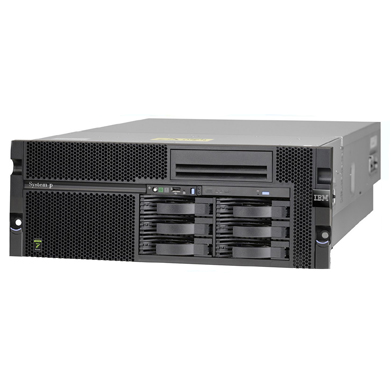 get a quick quote
get a quick quote
